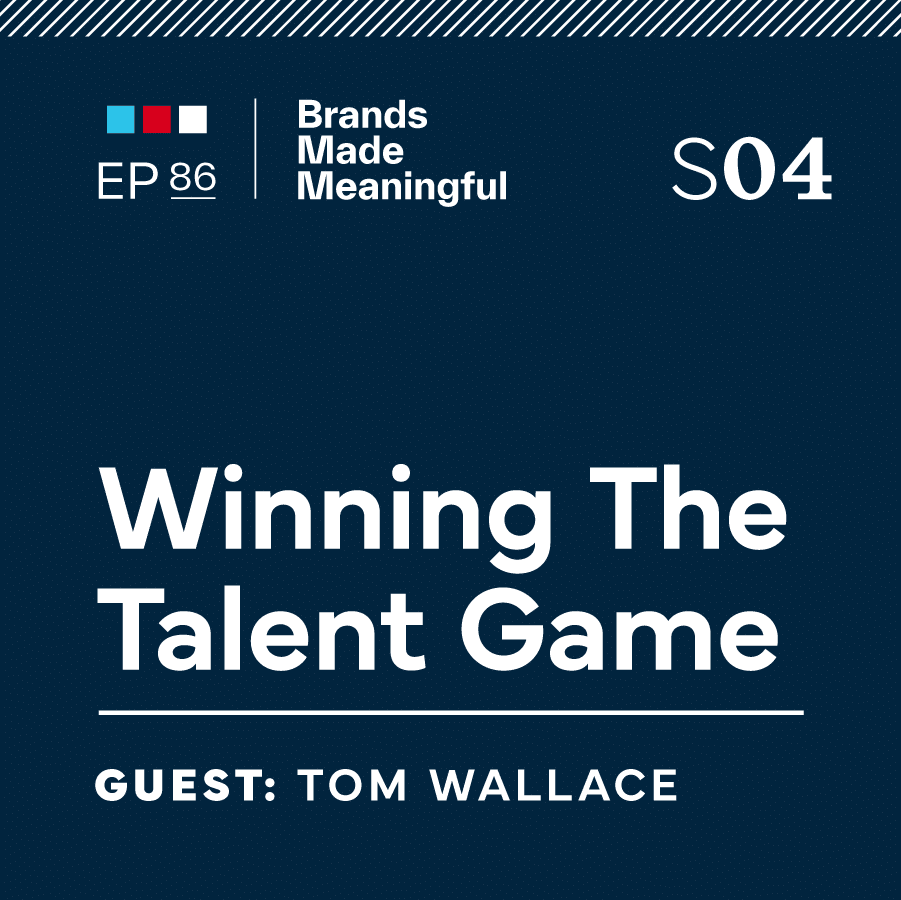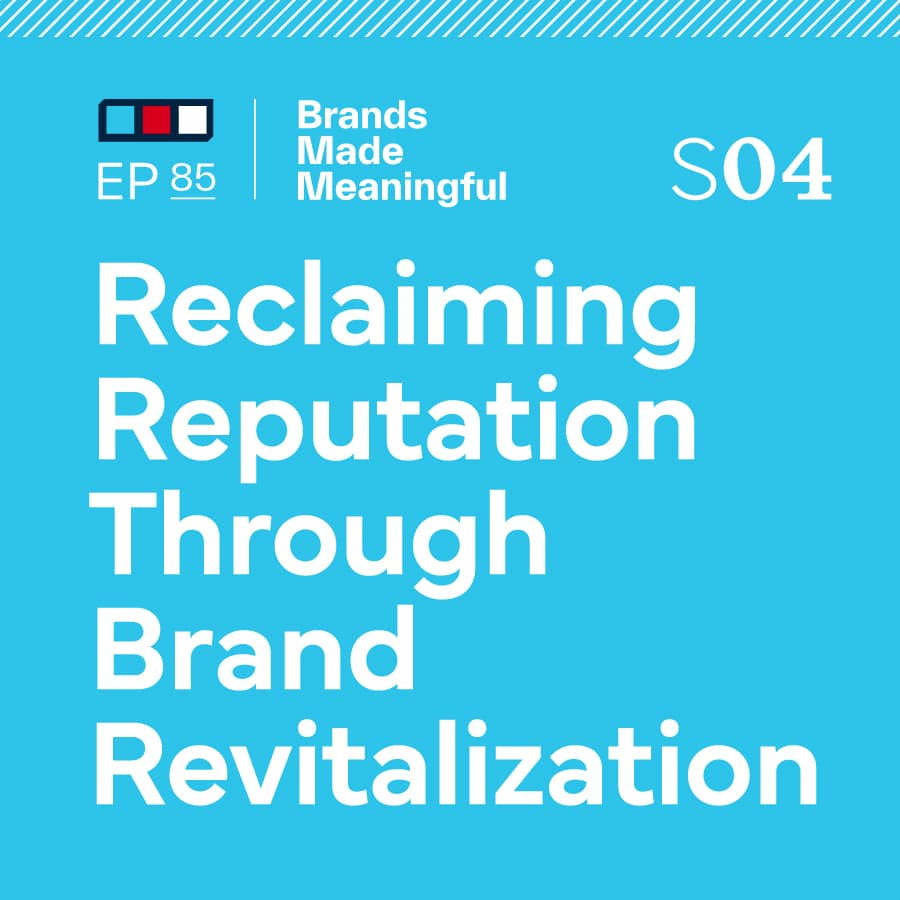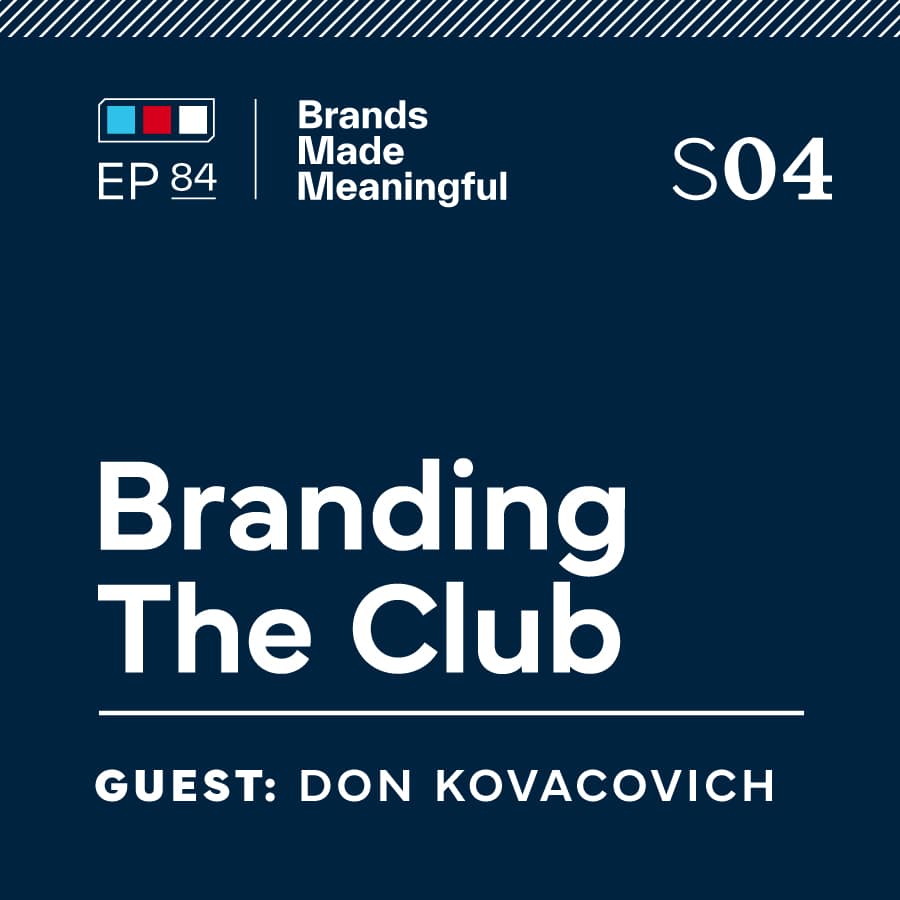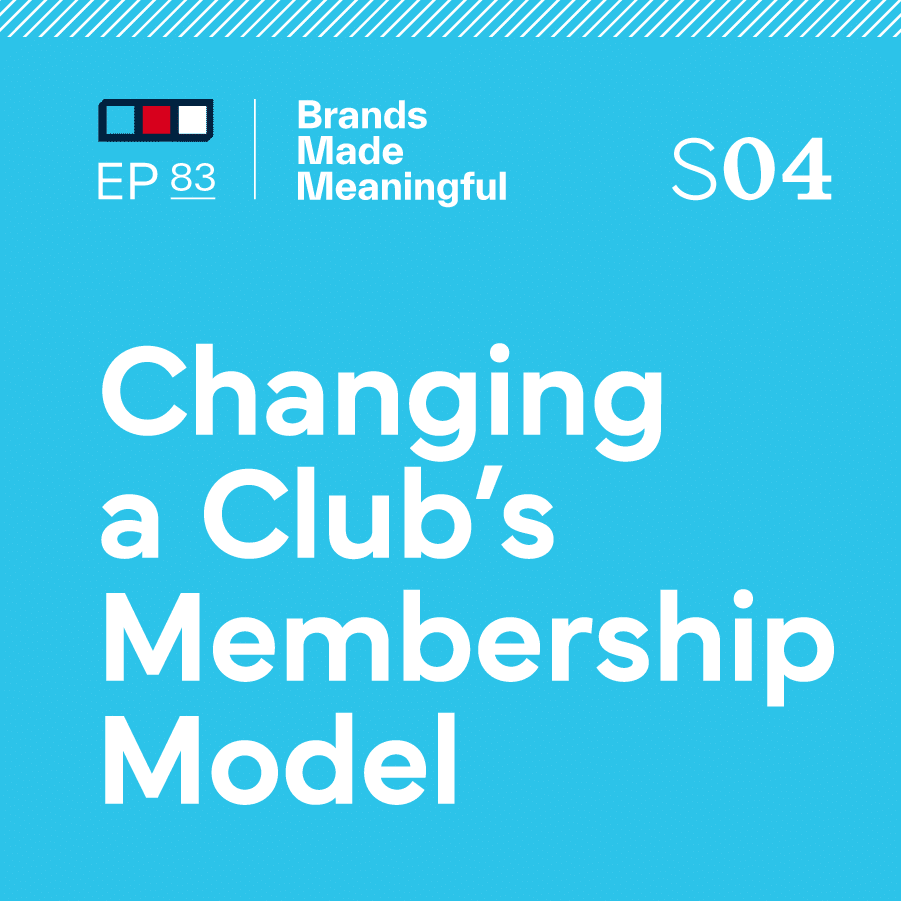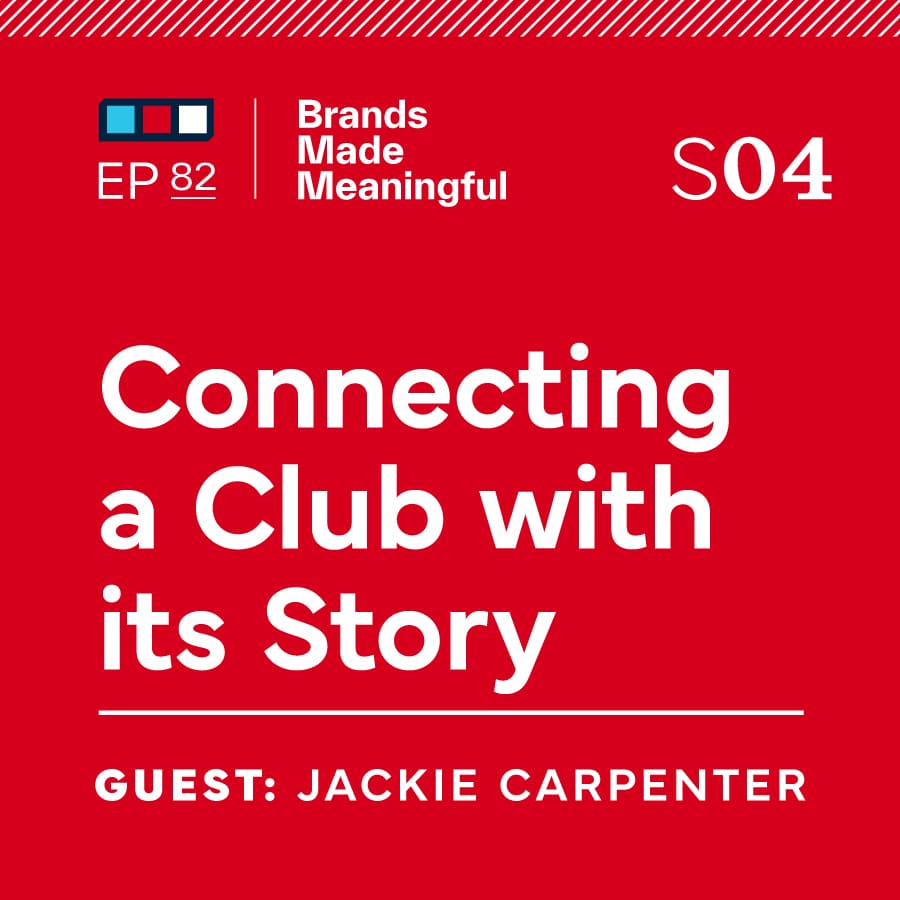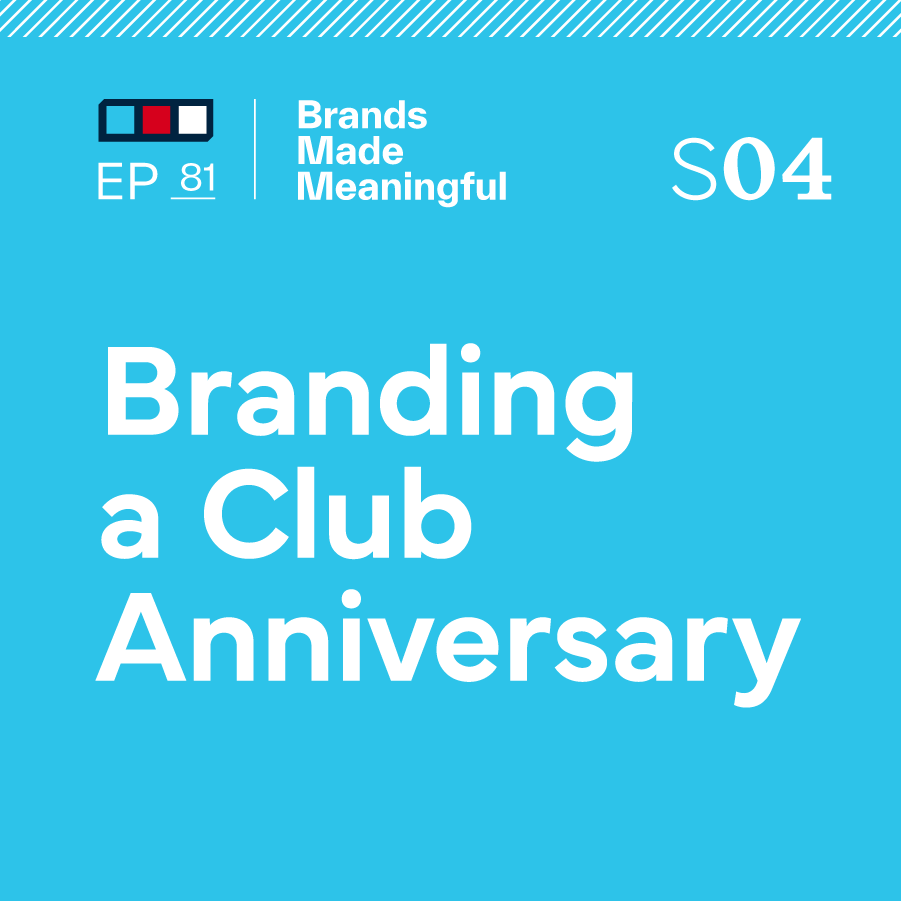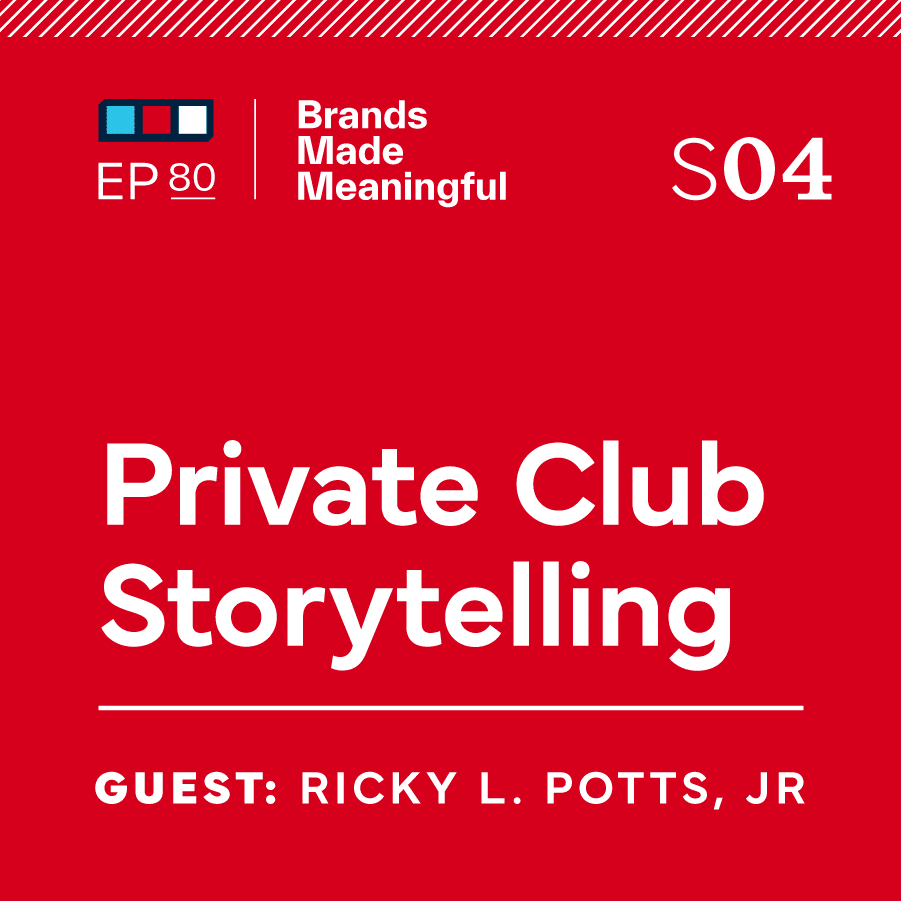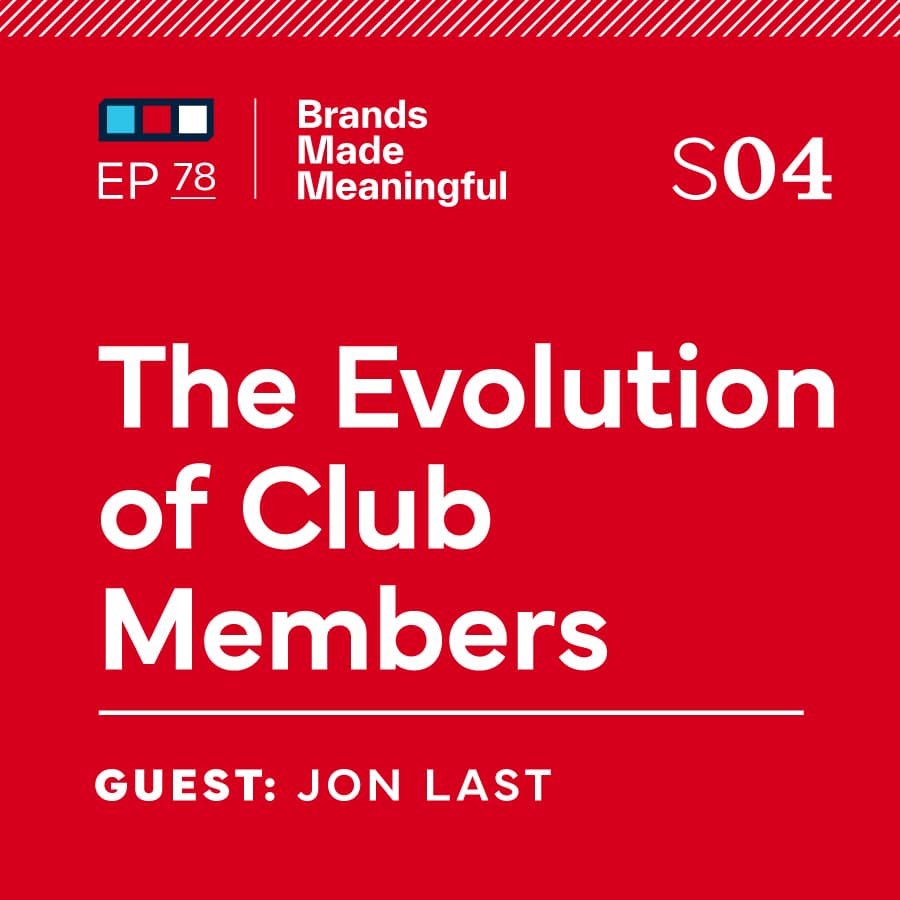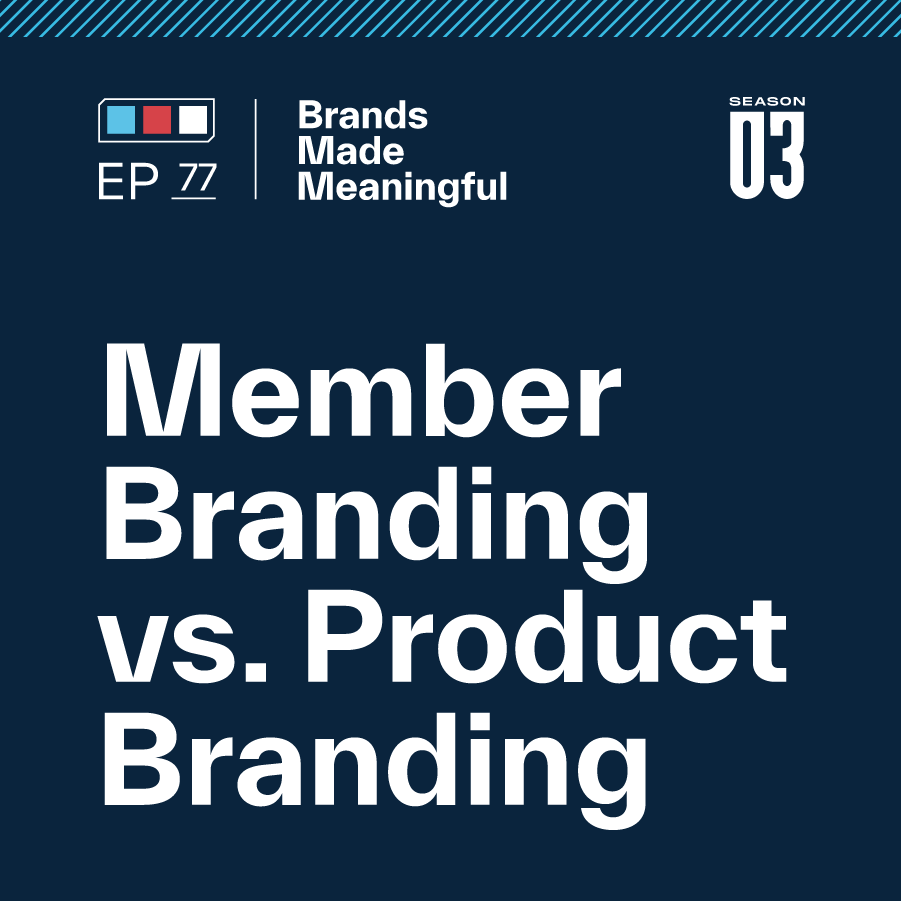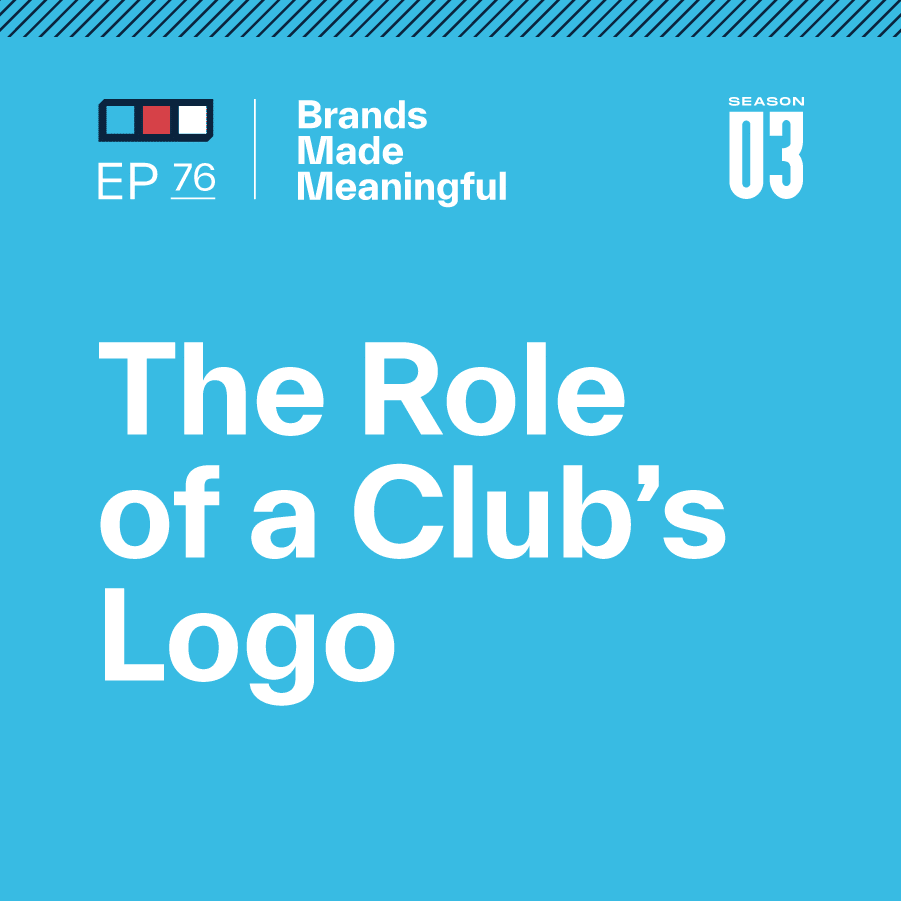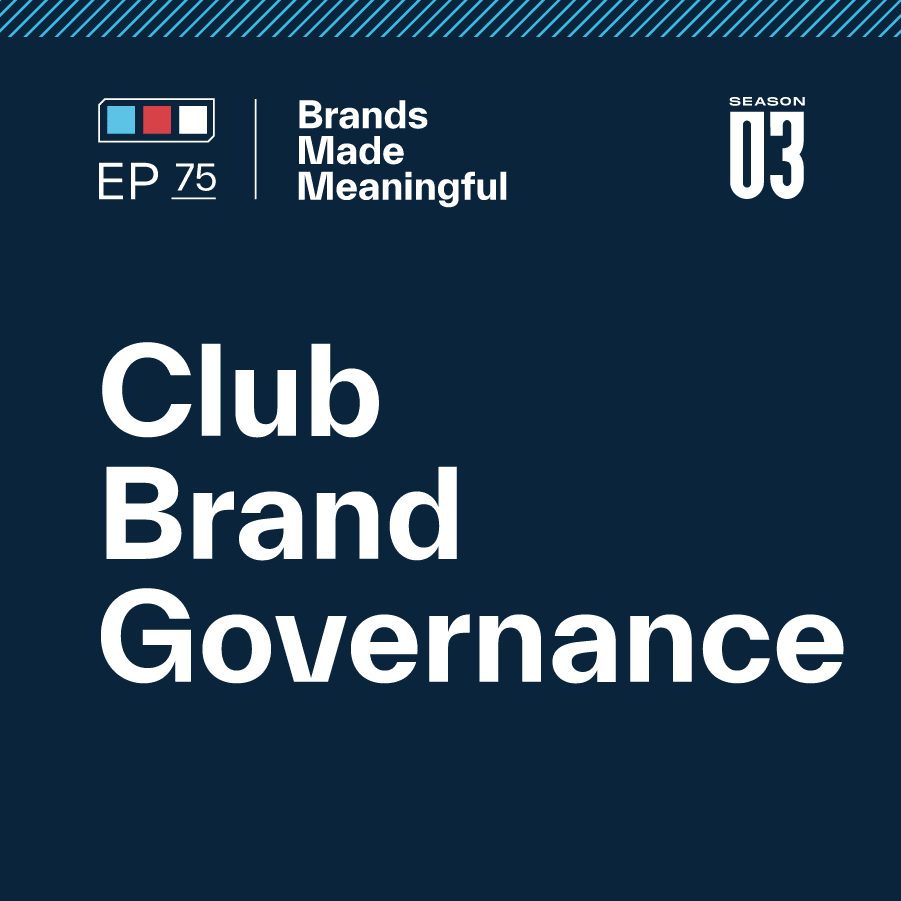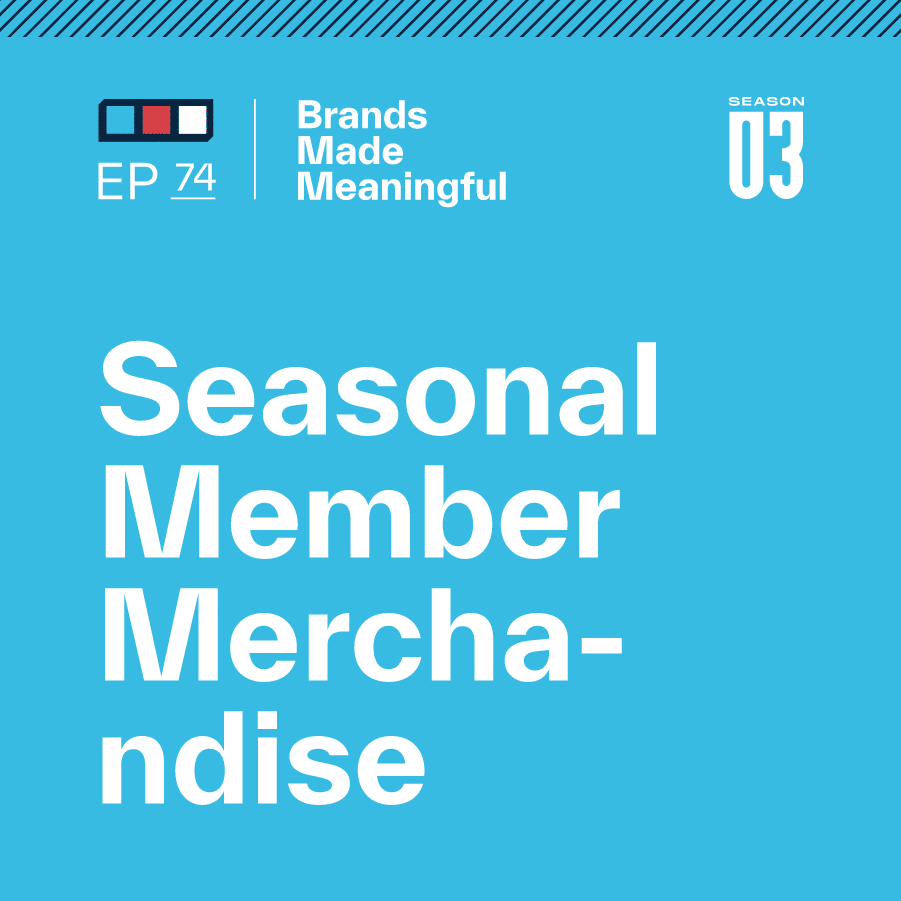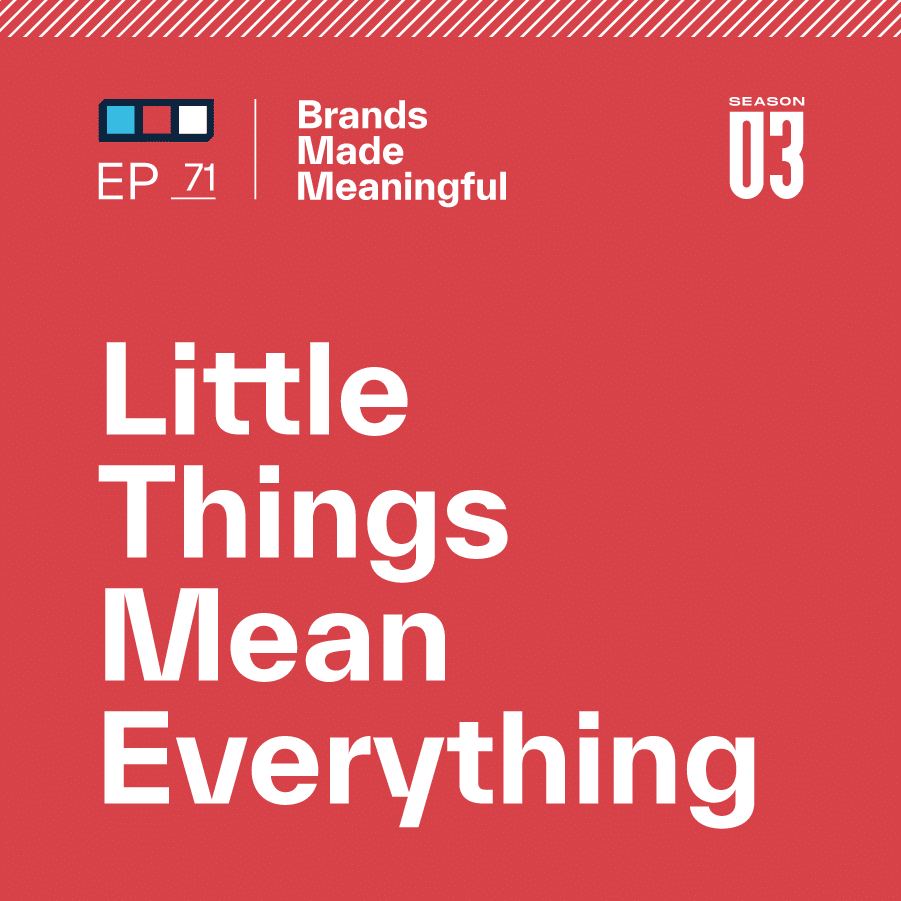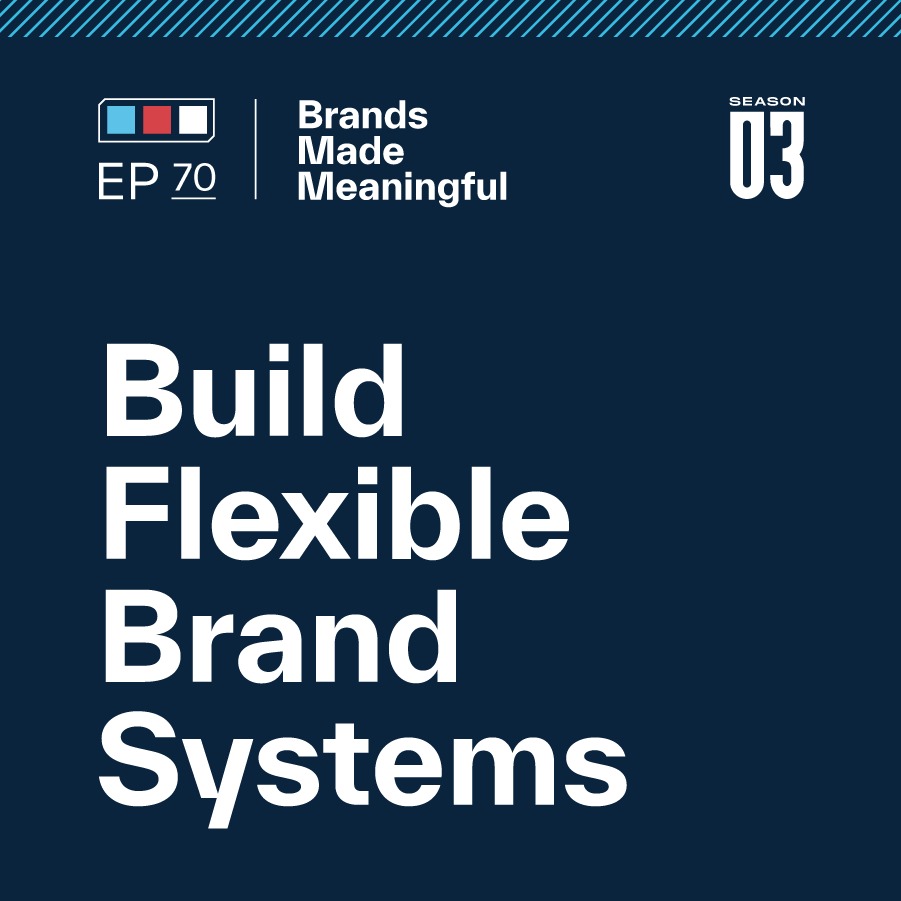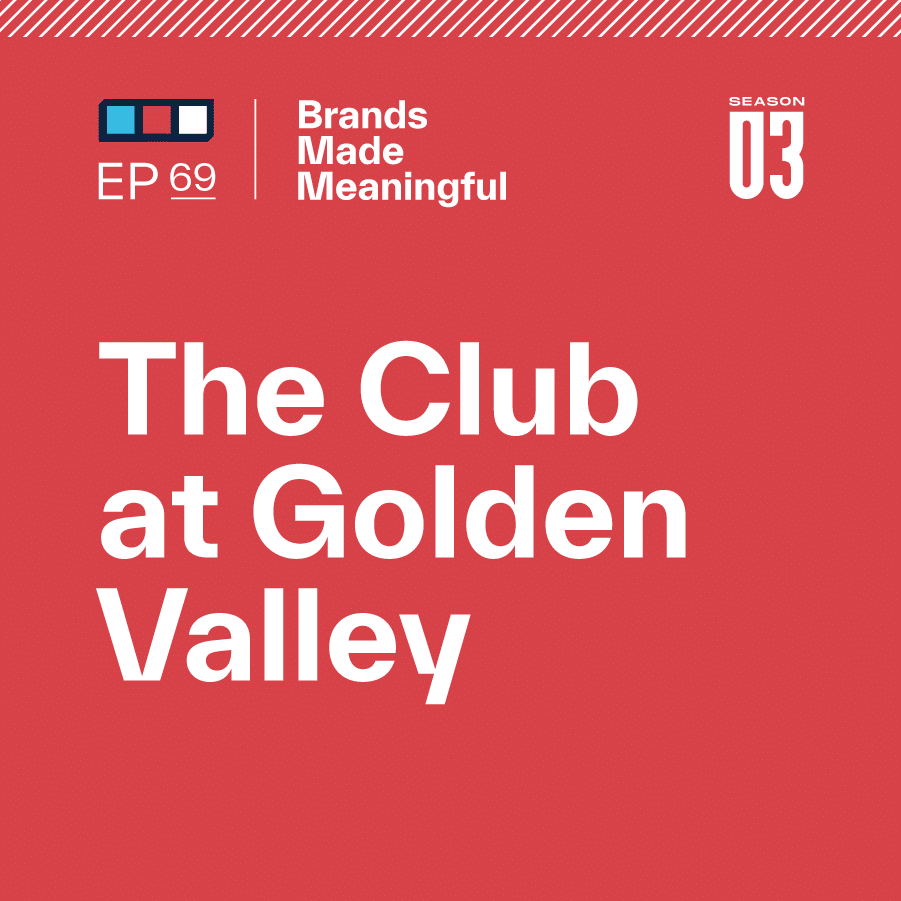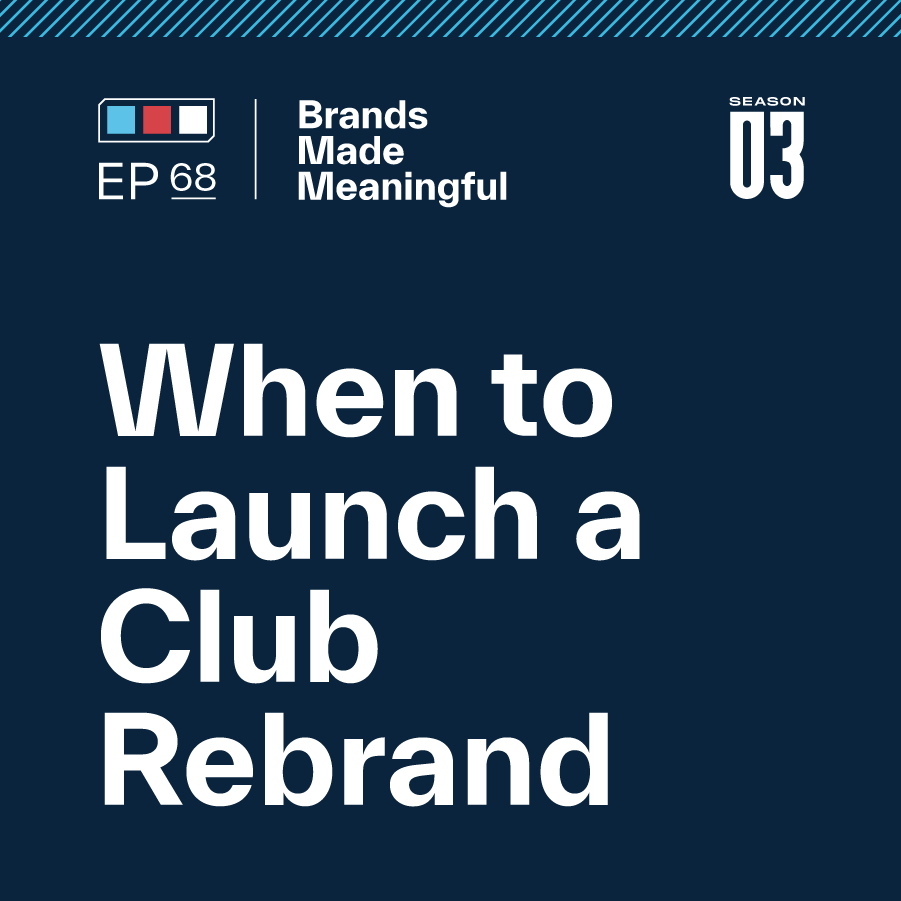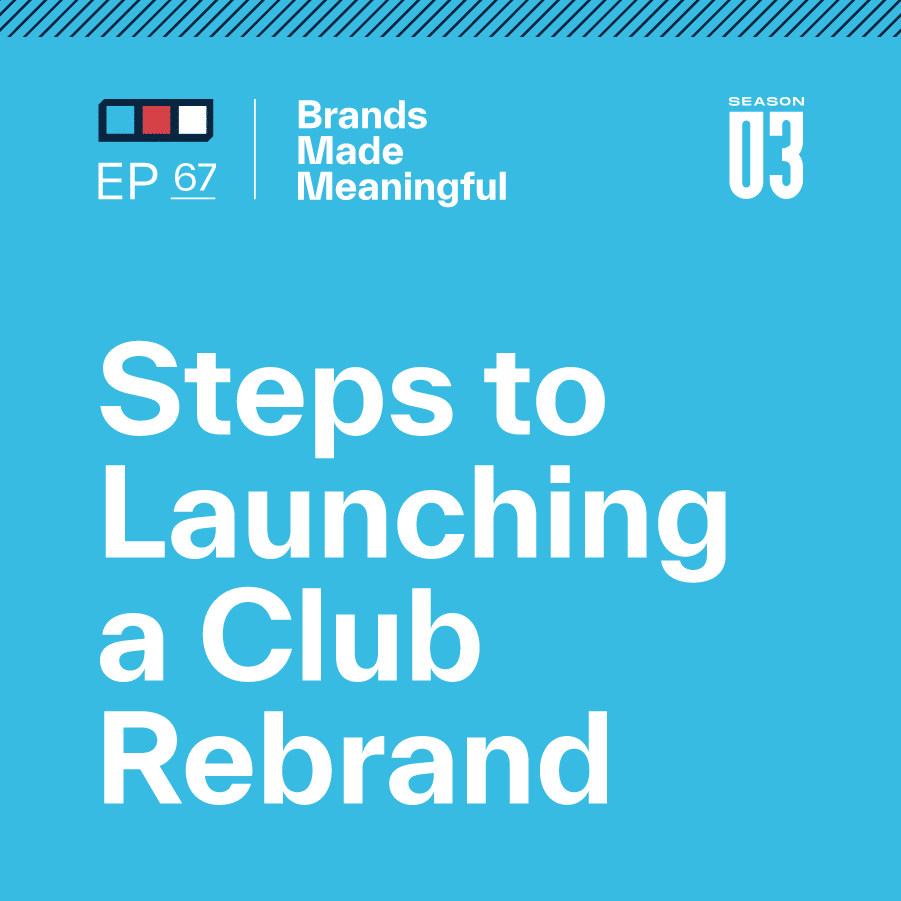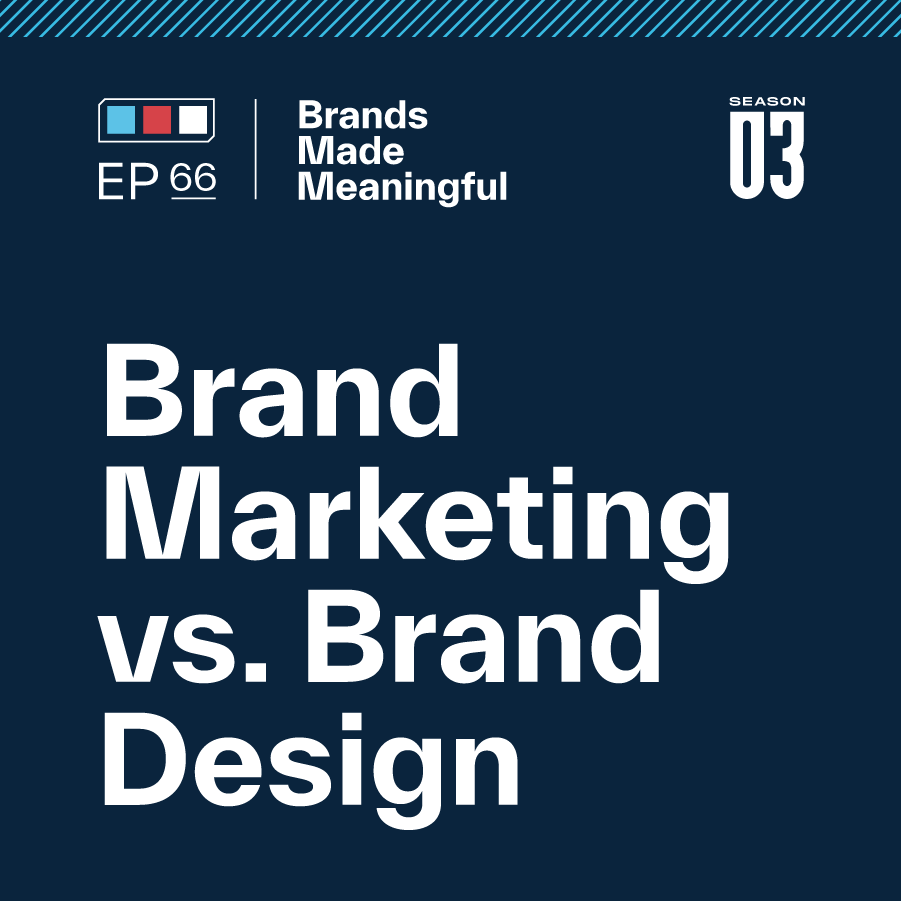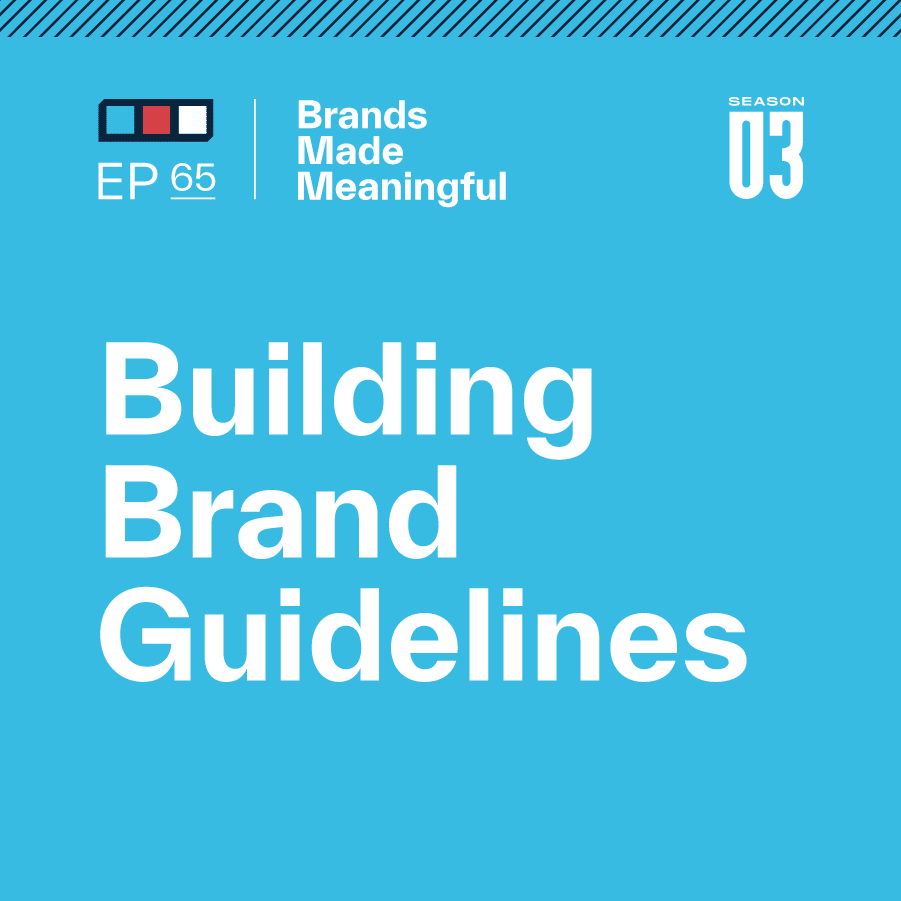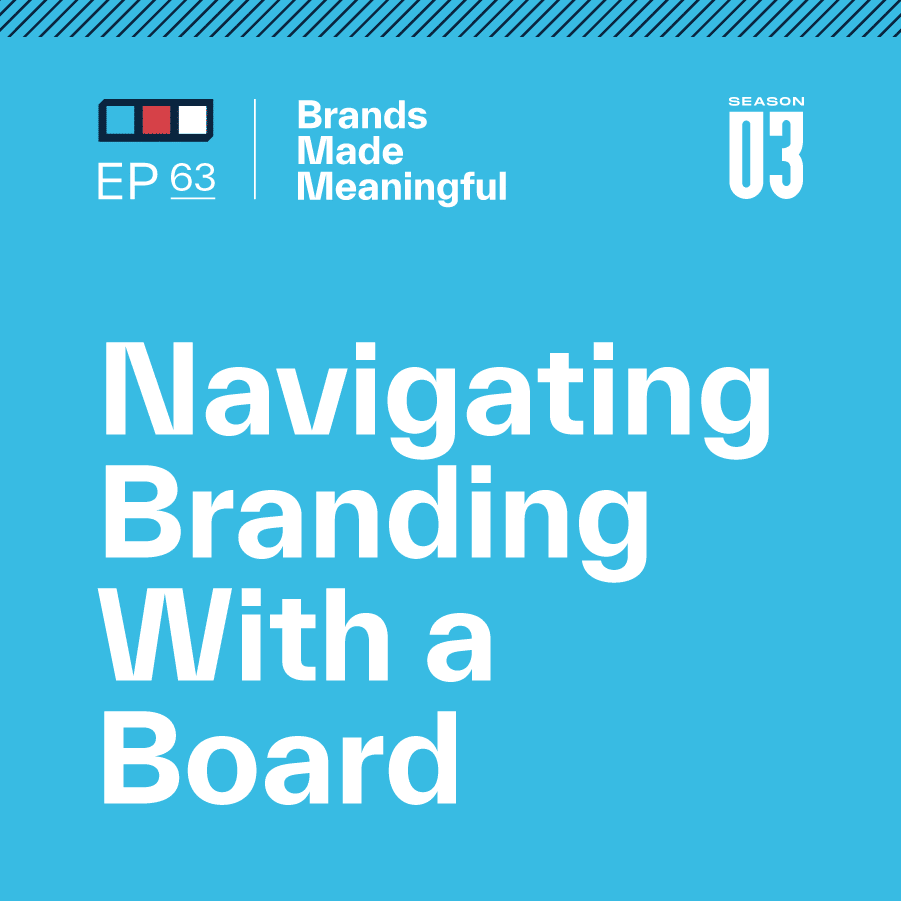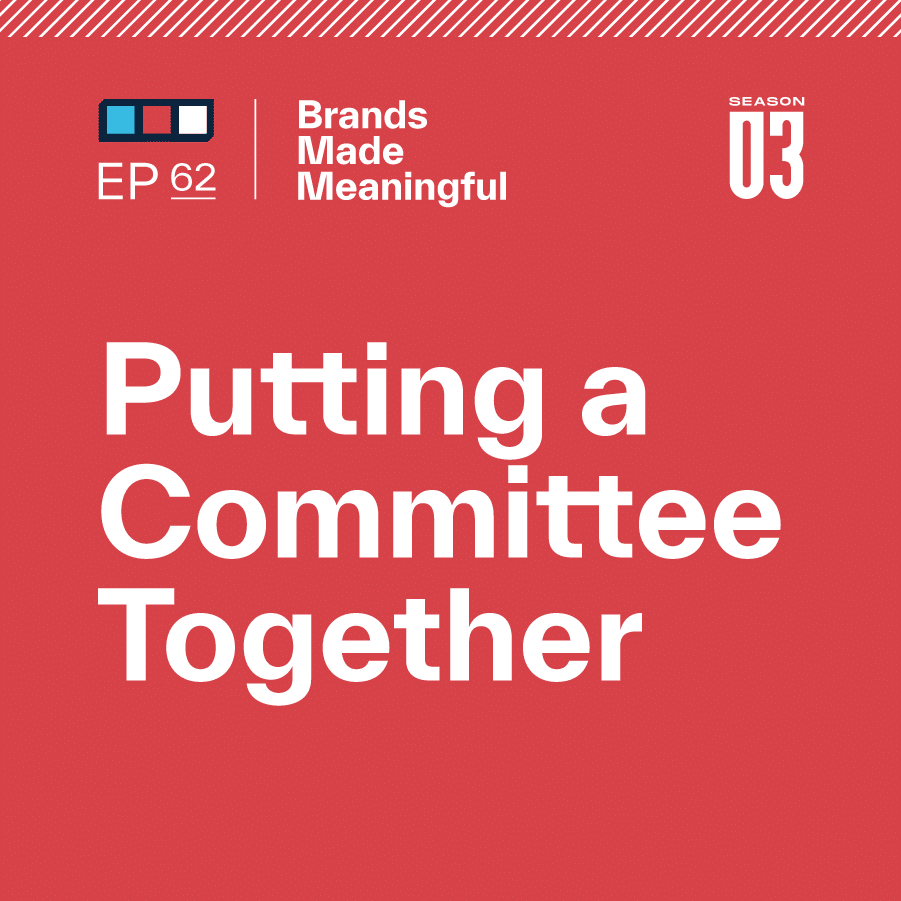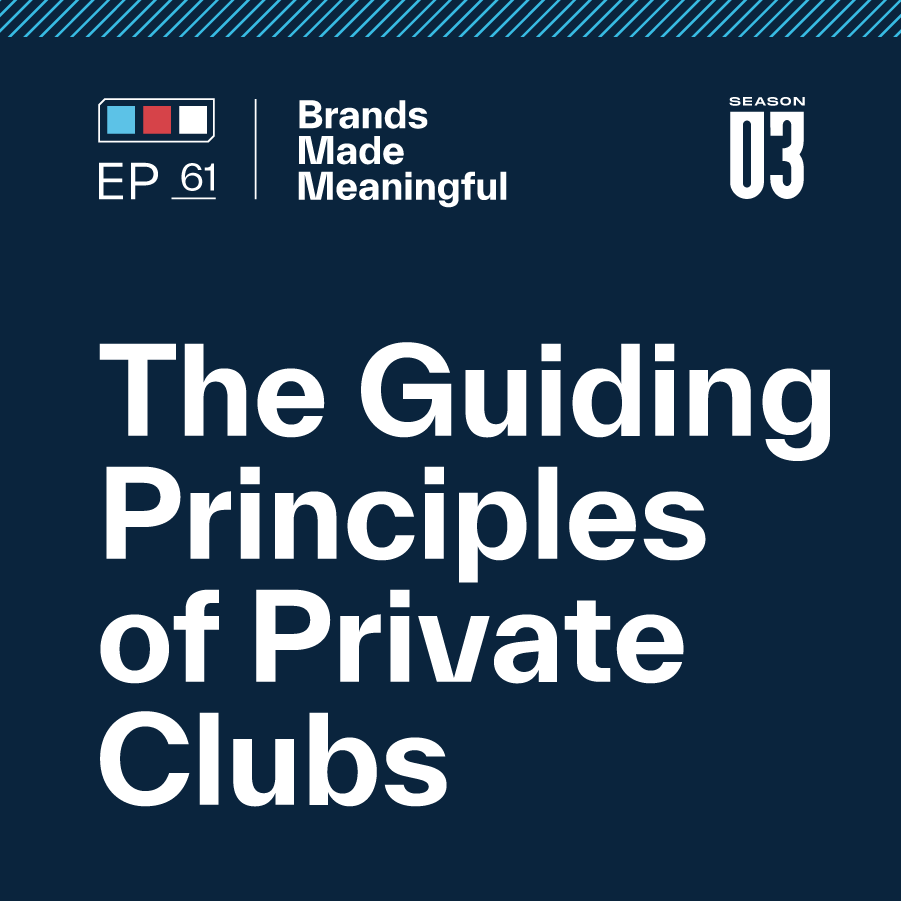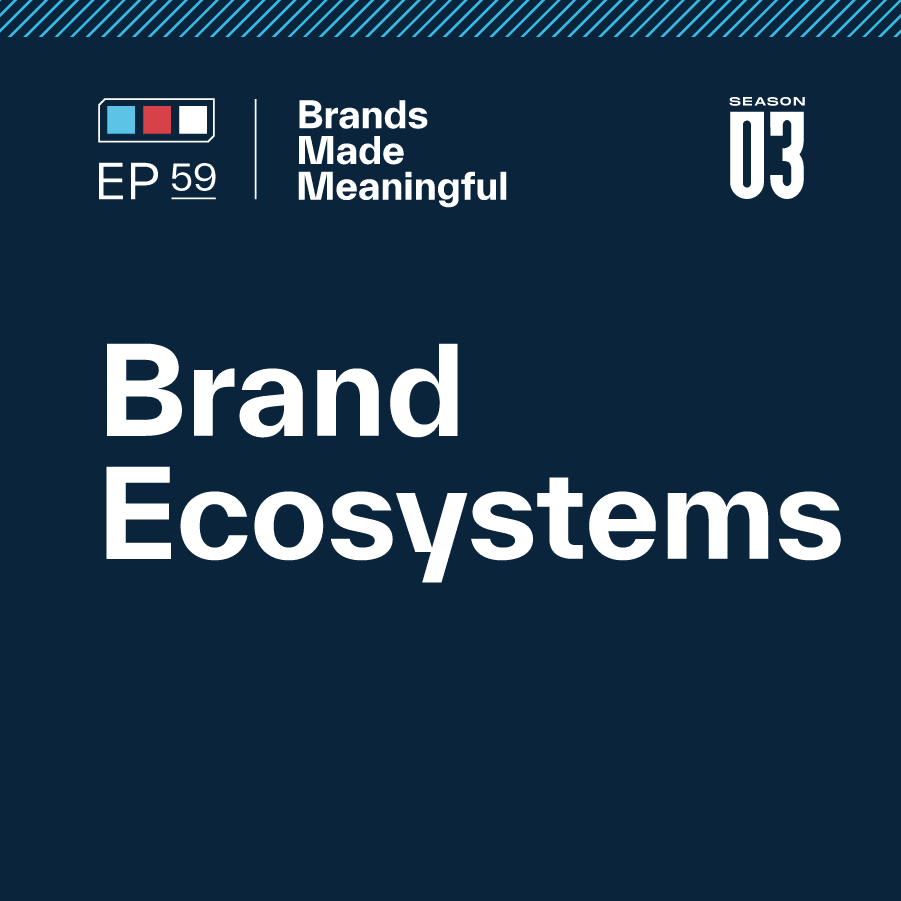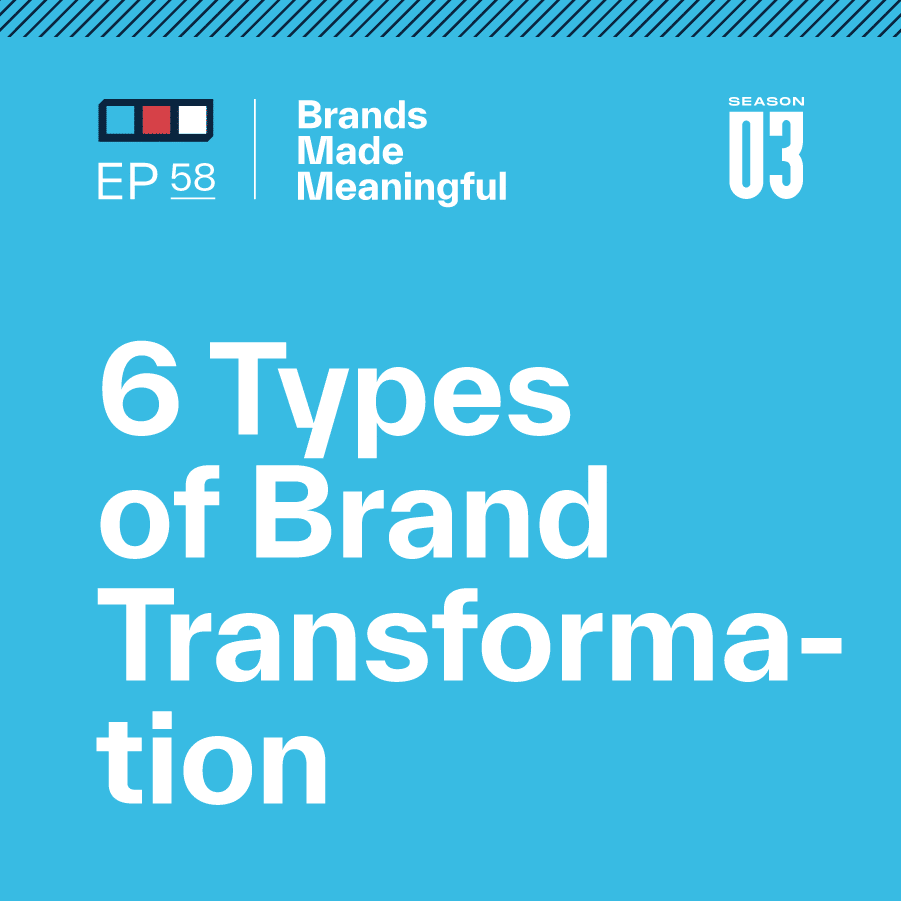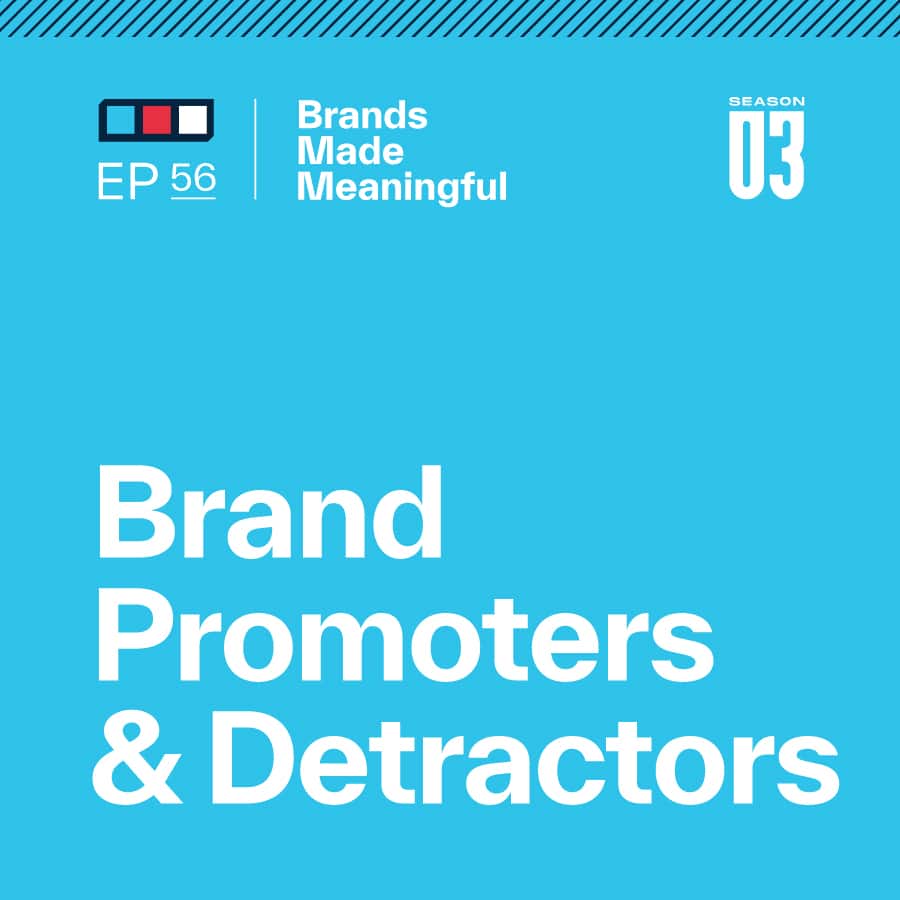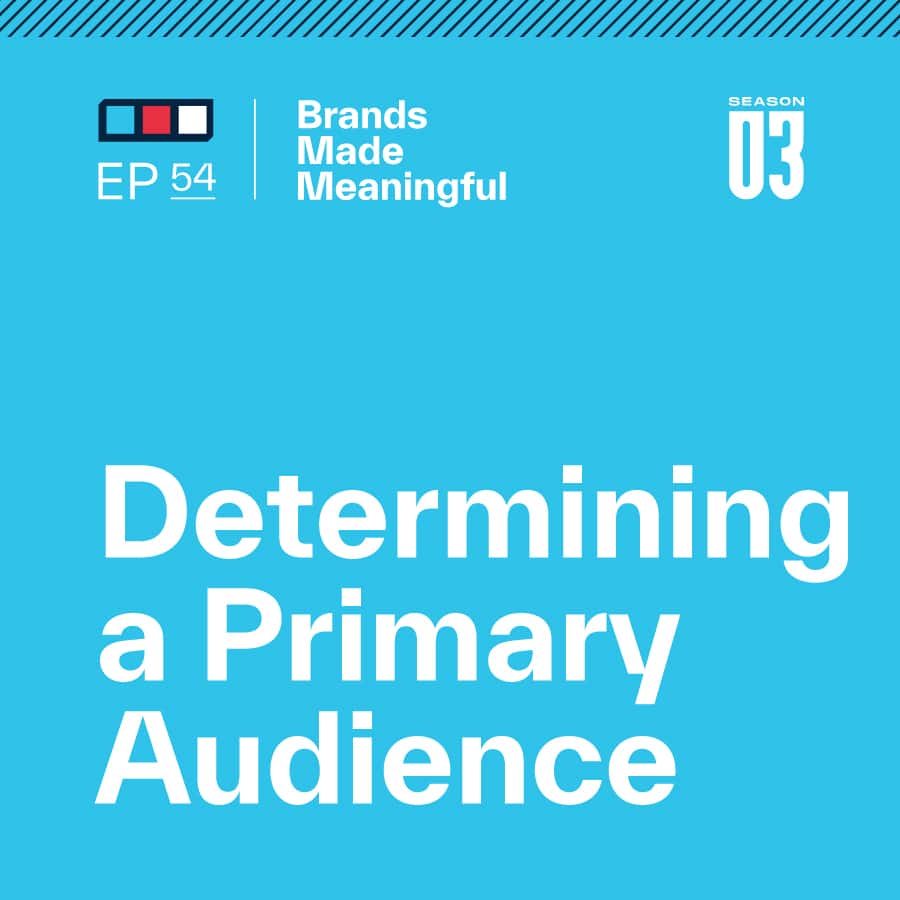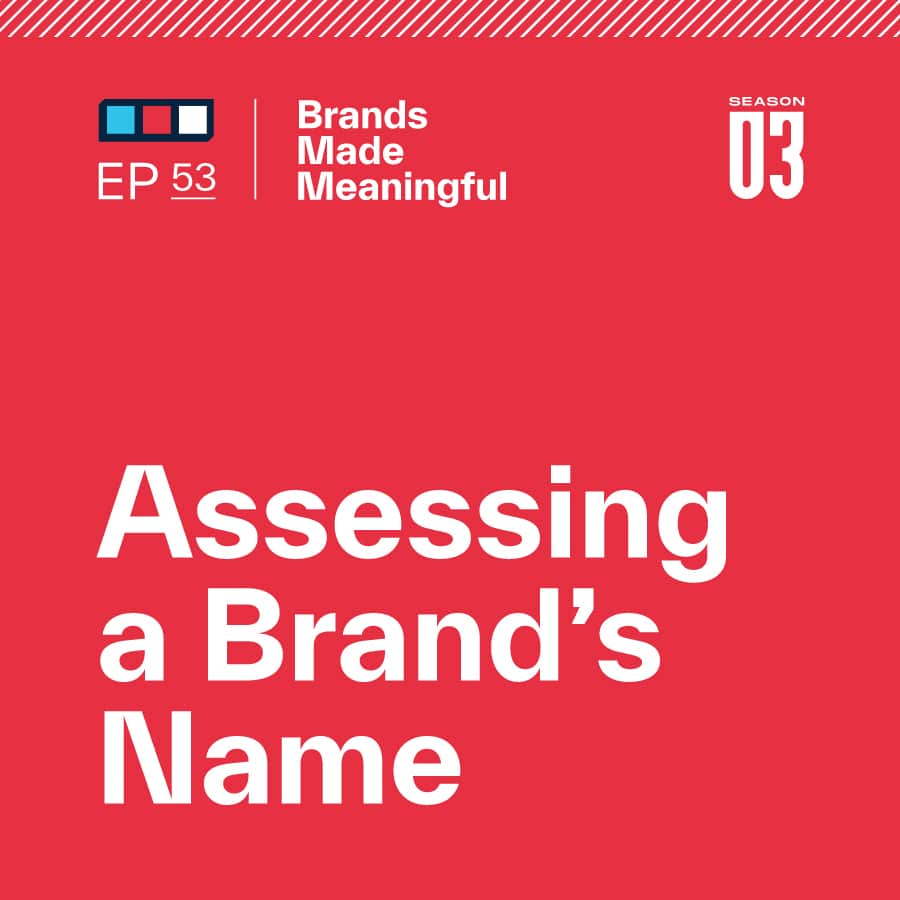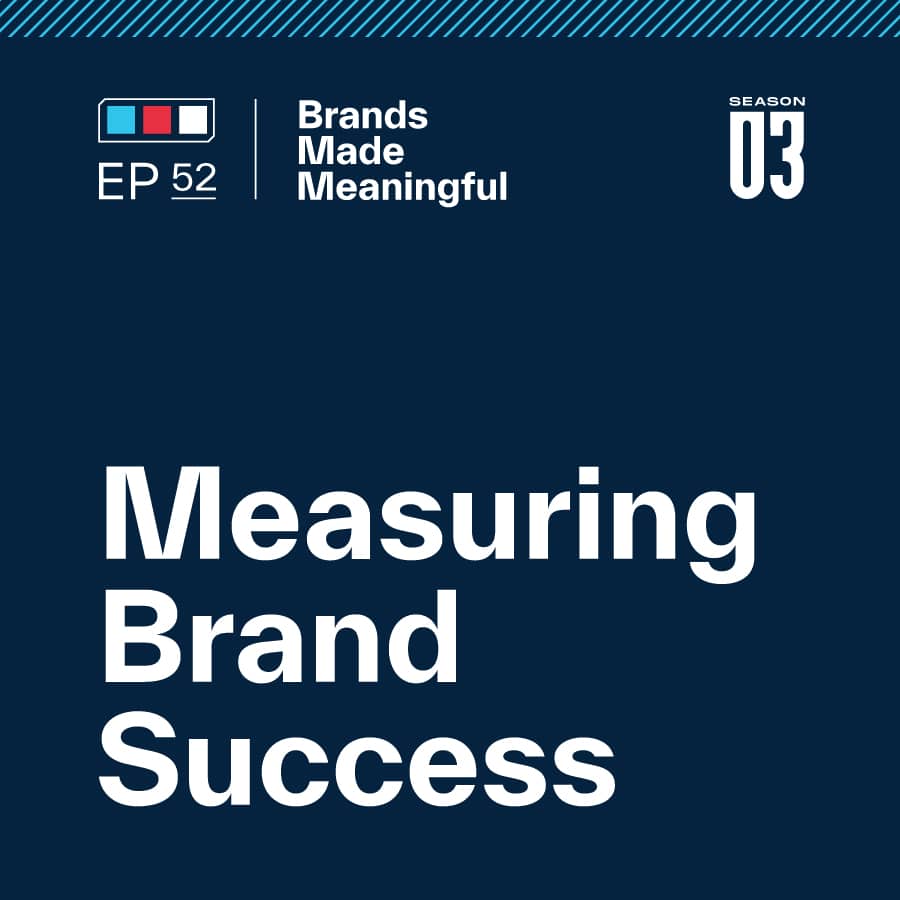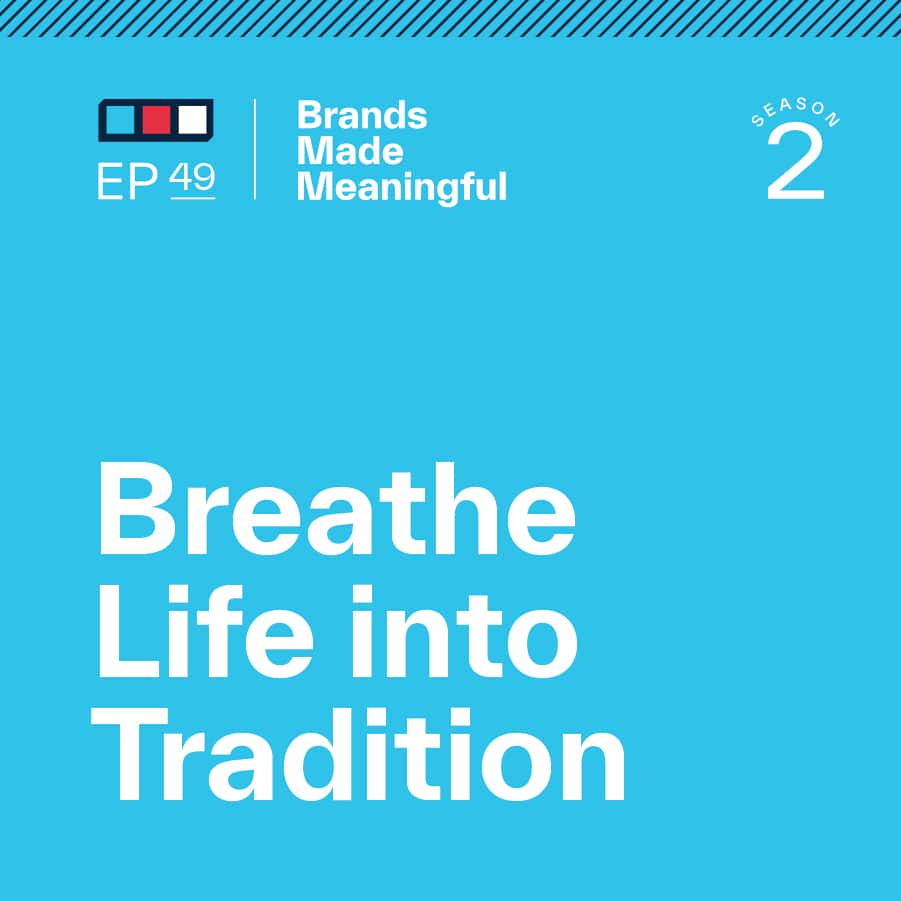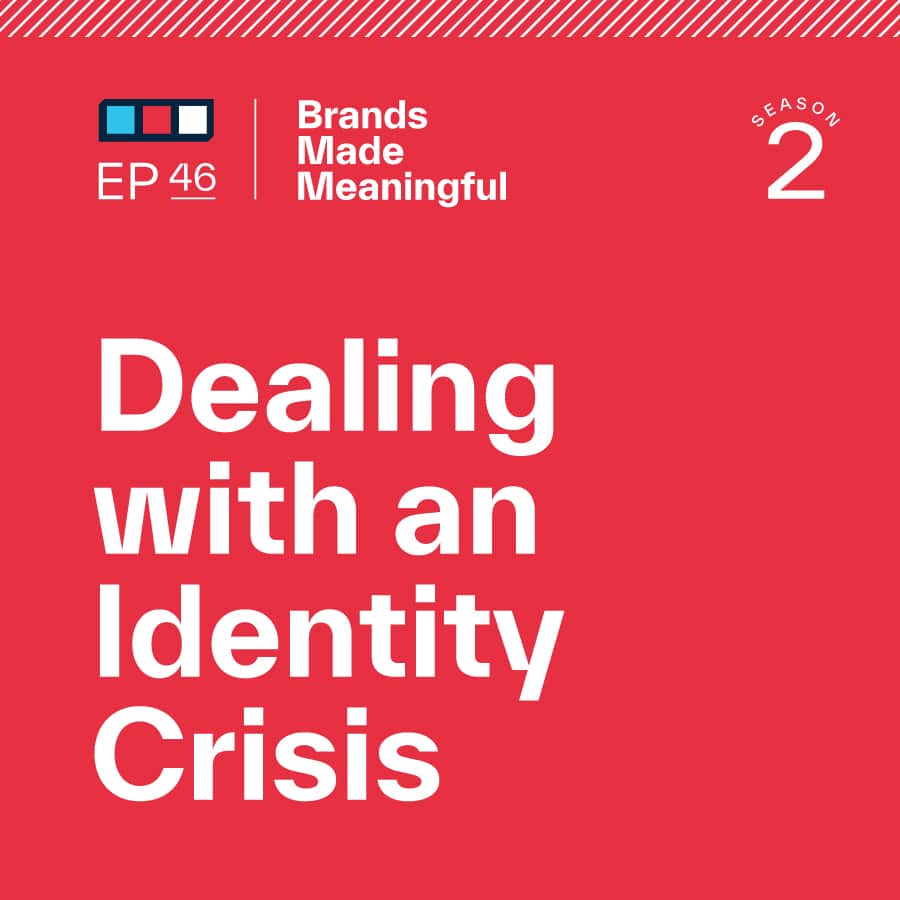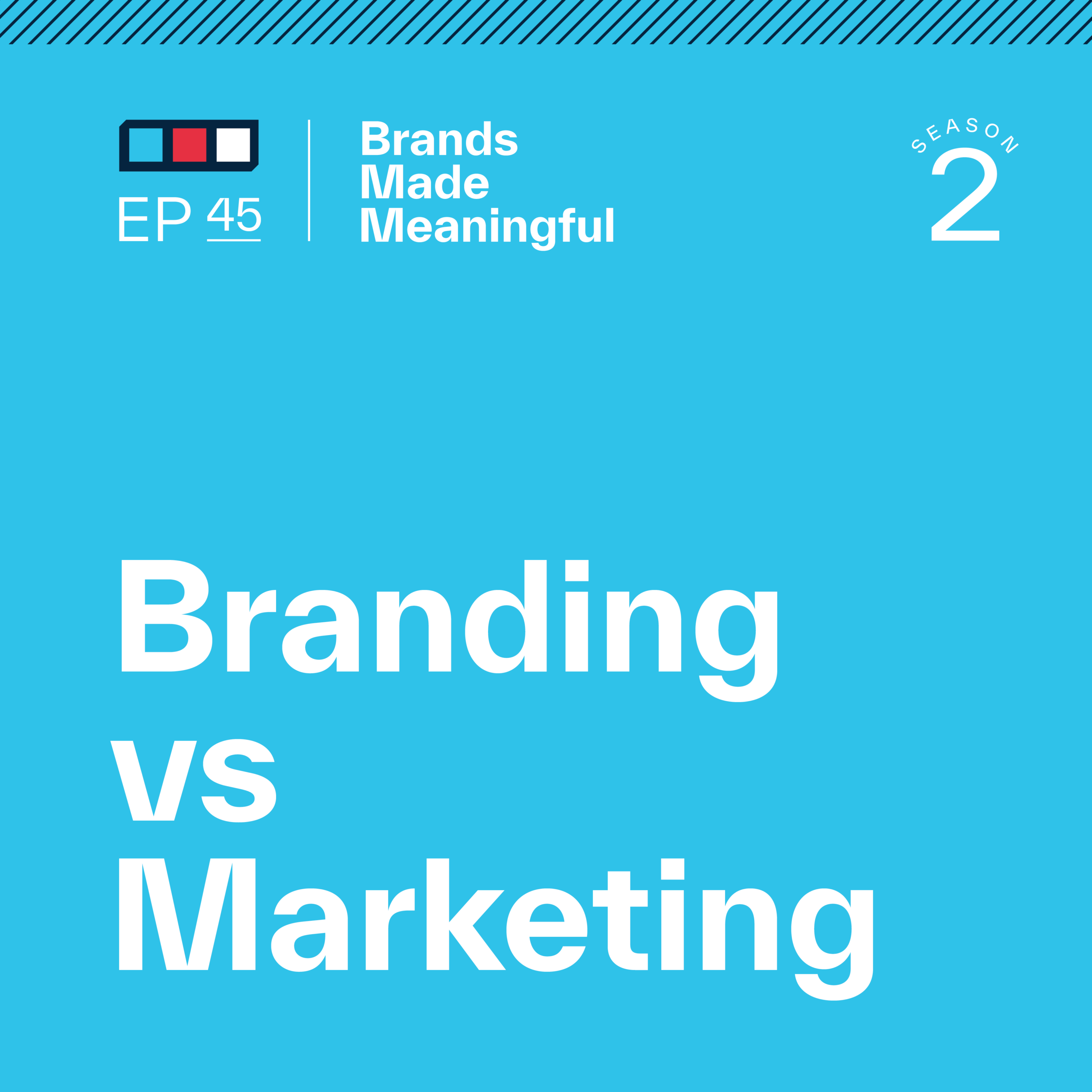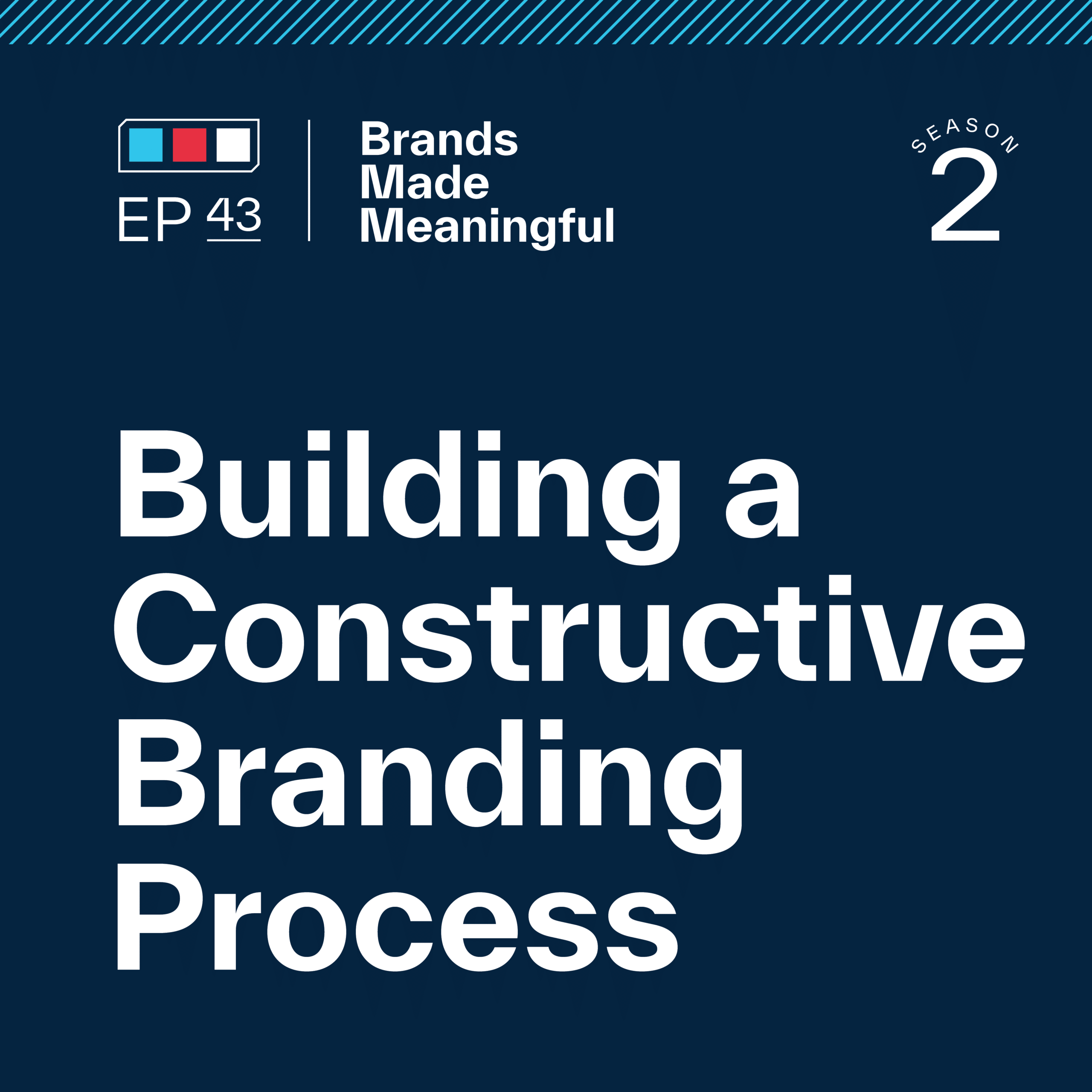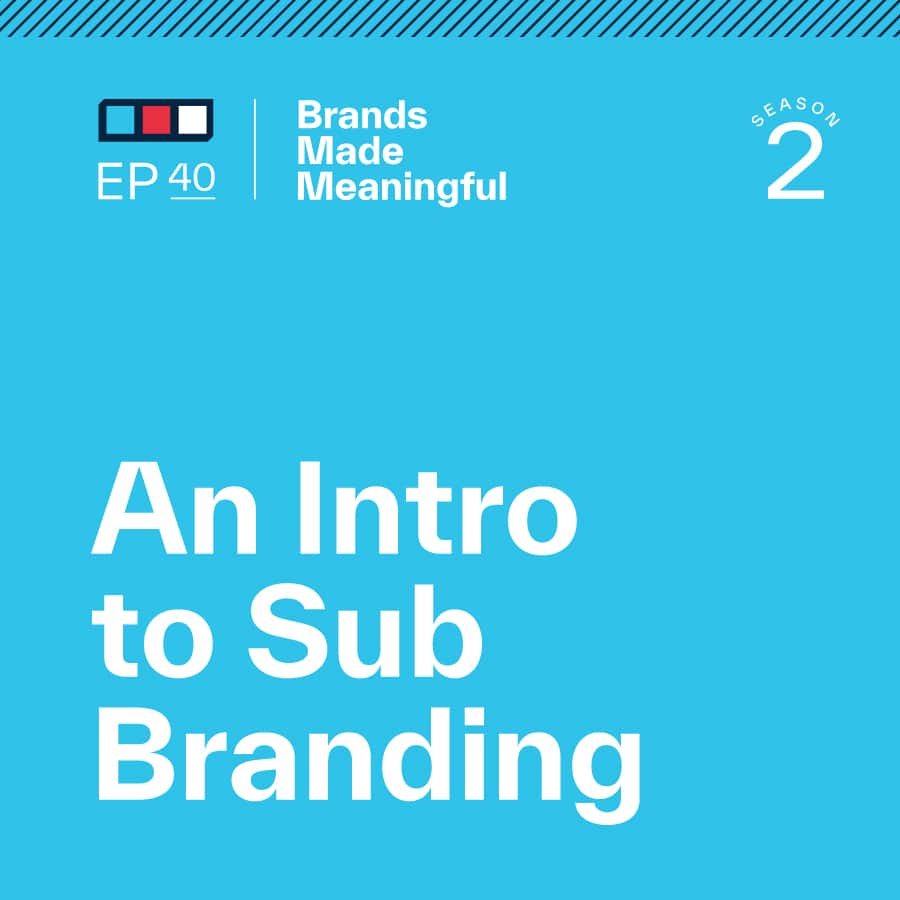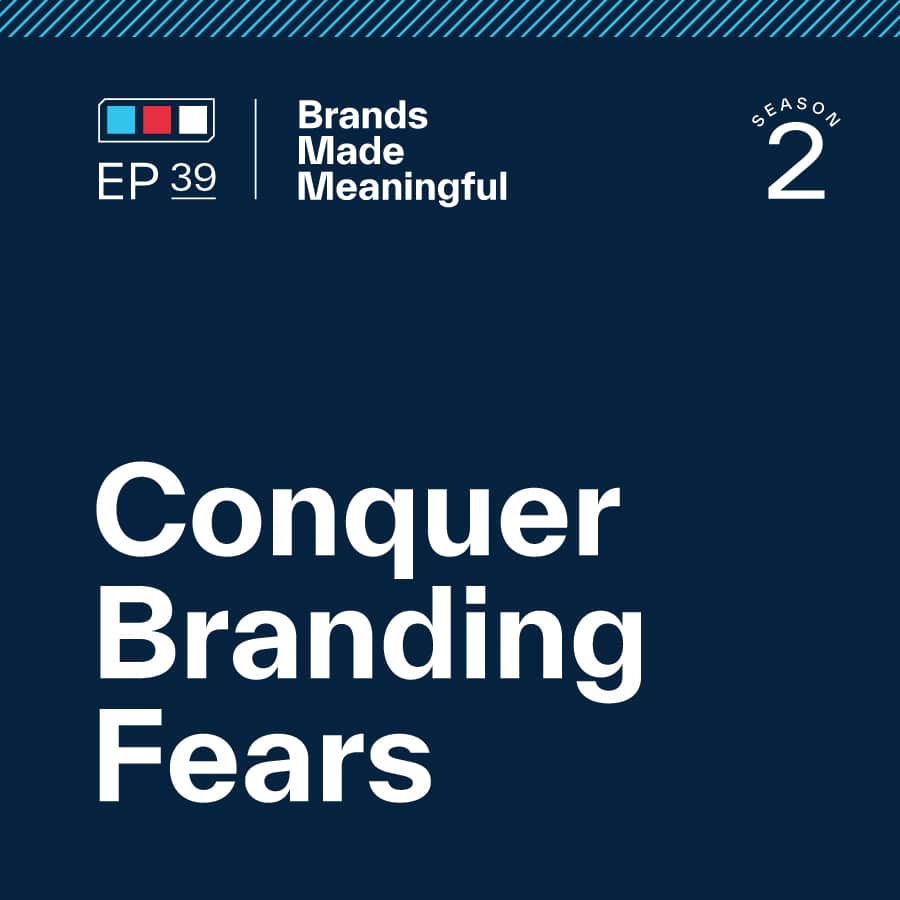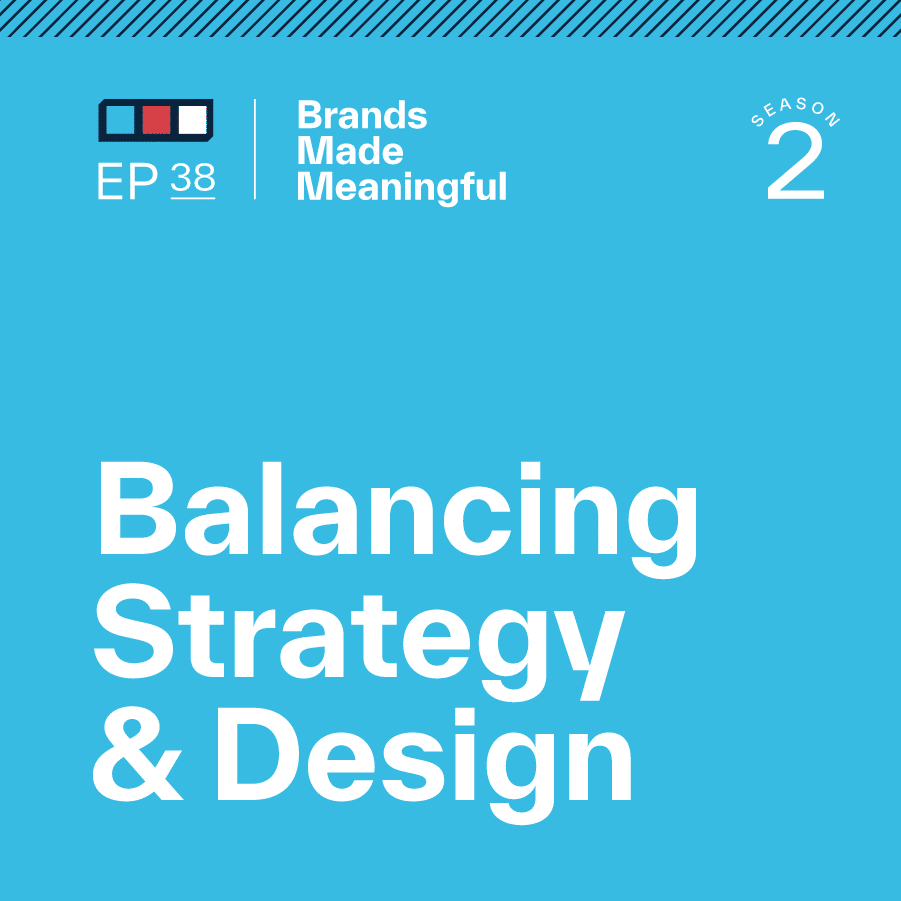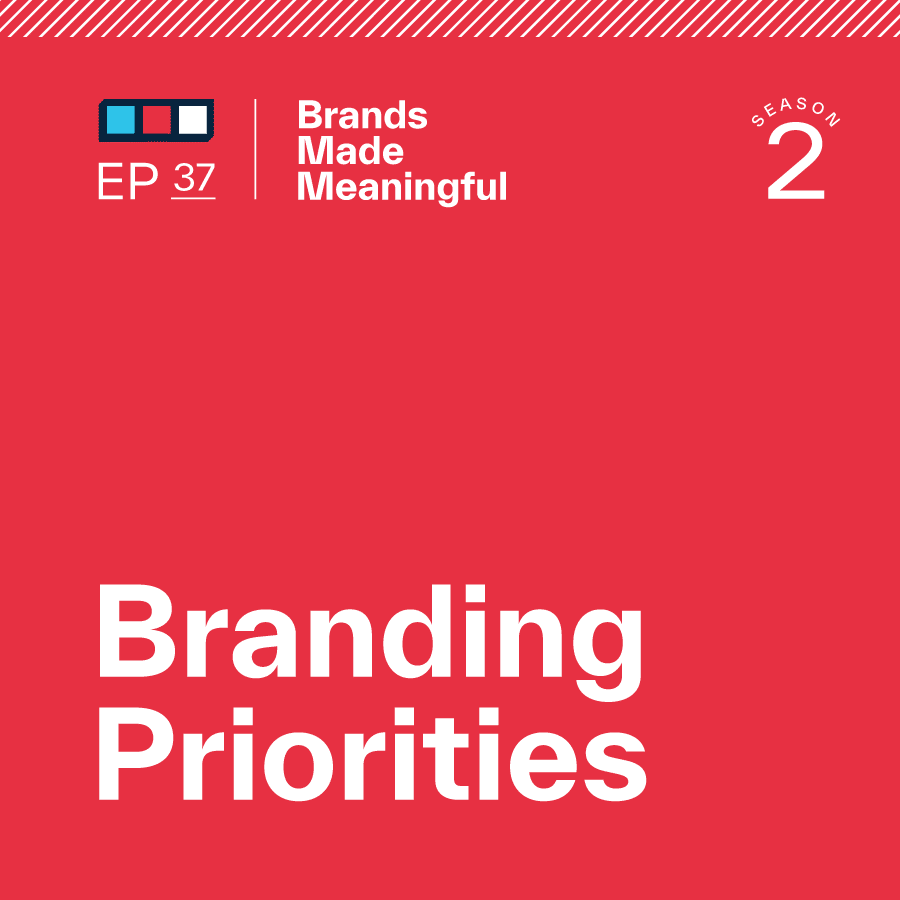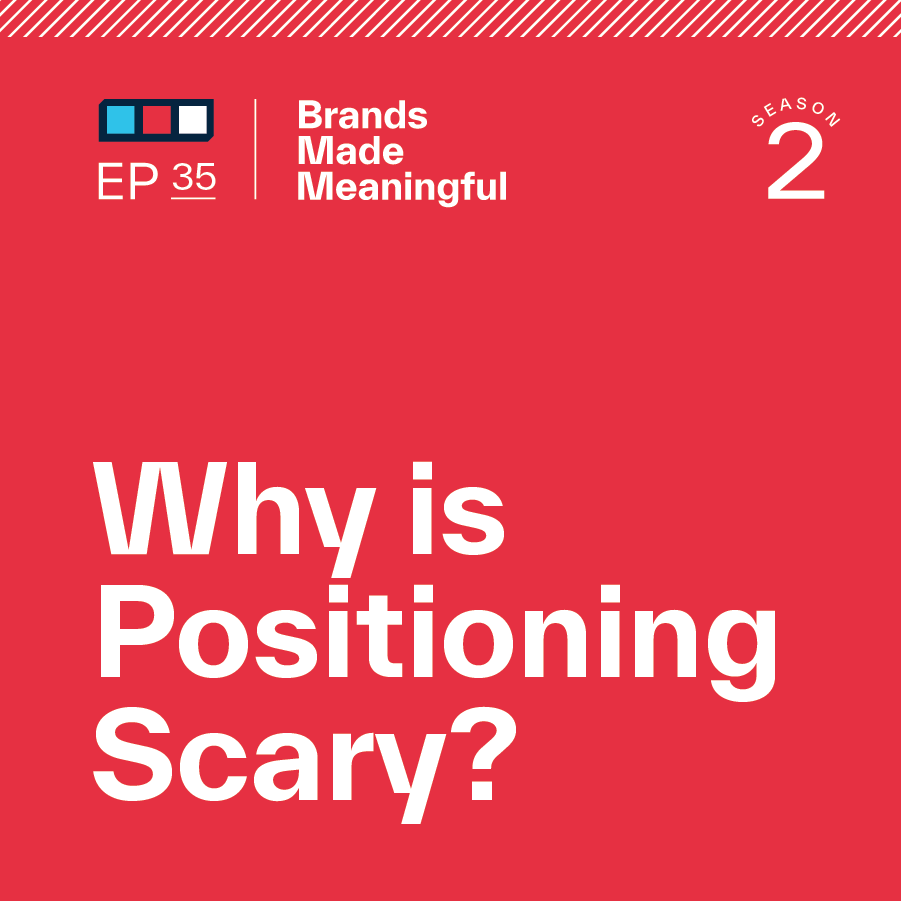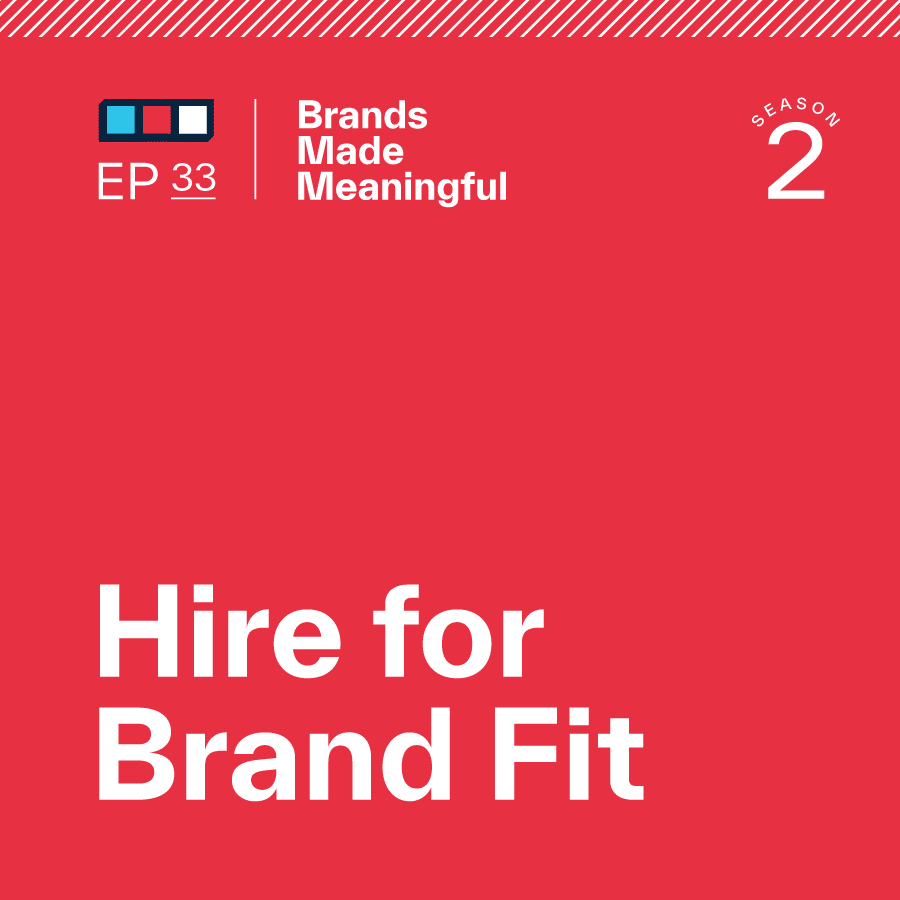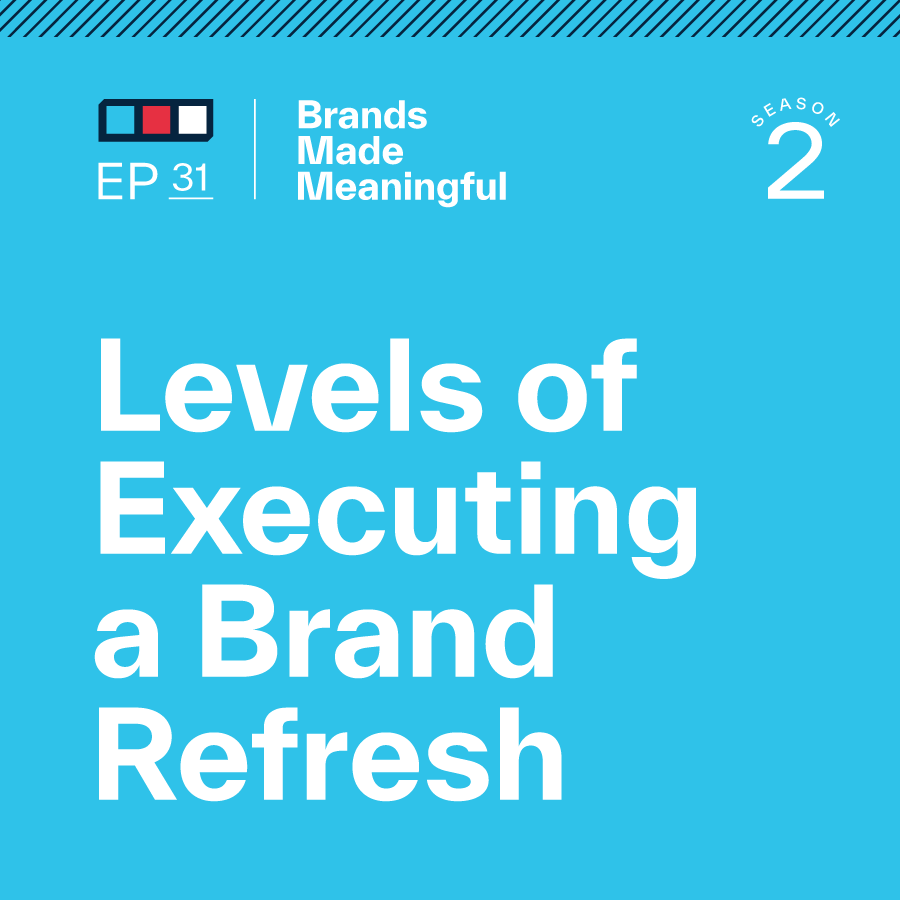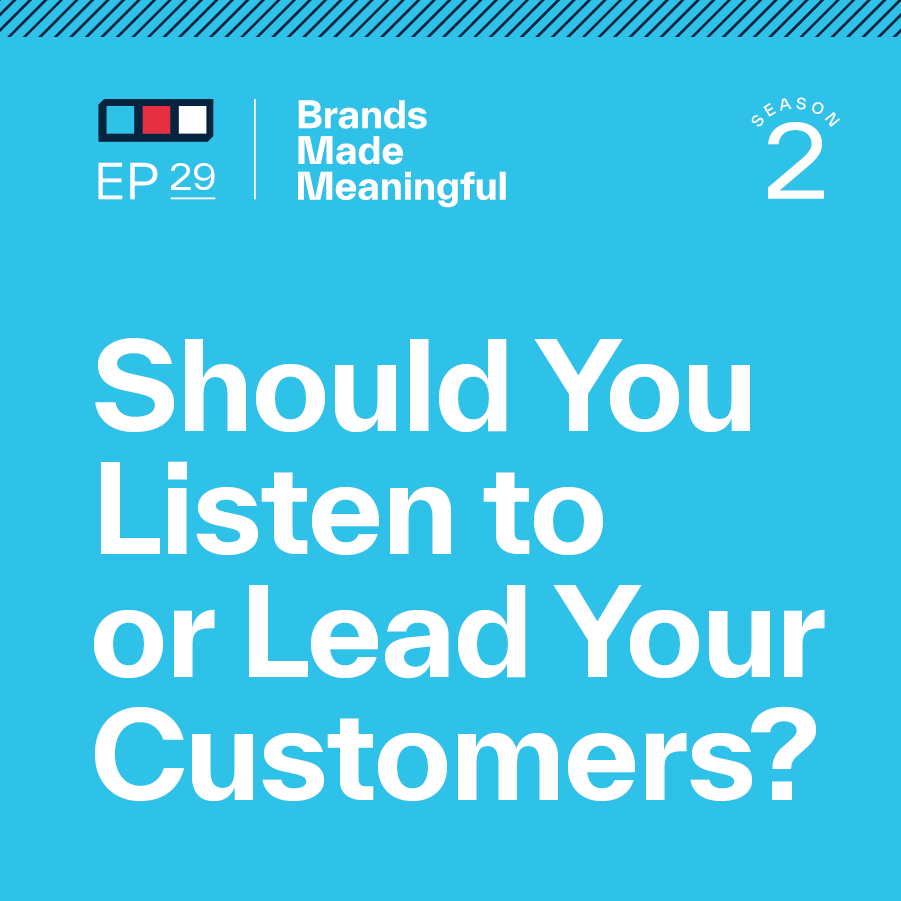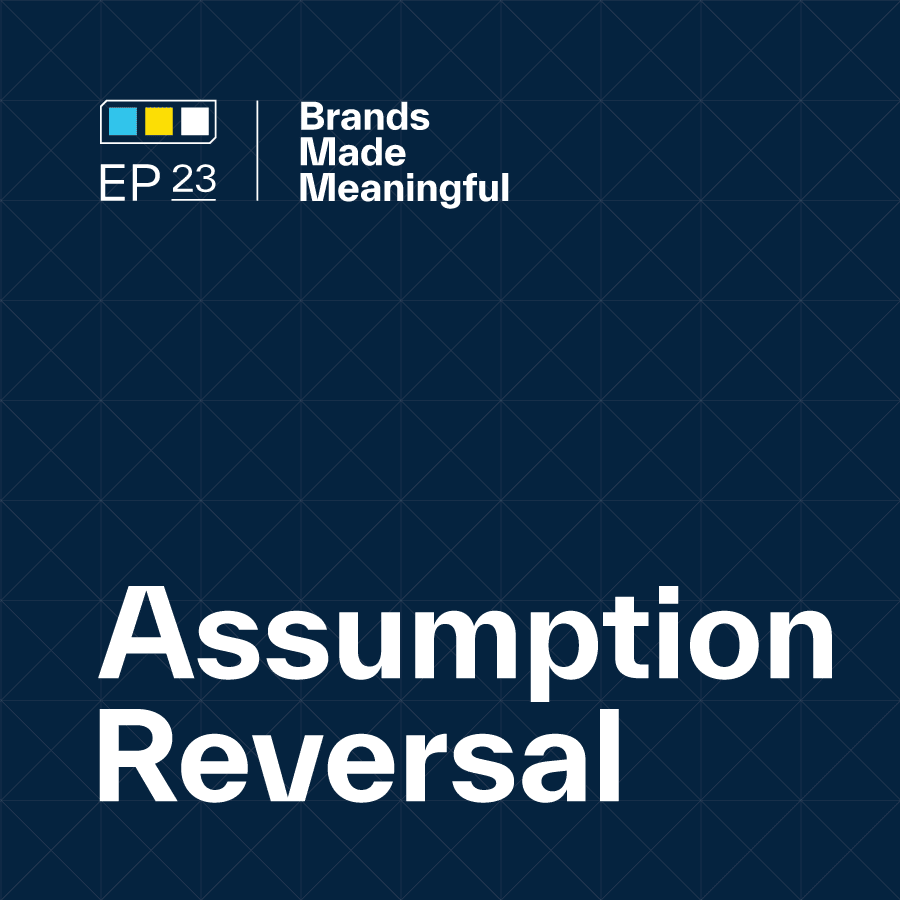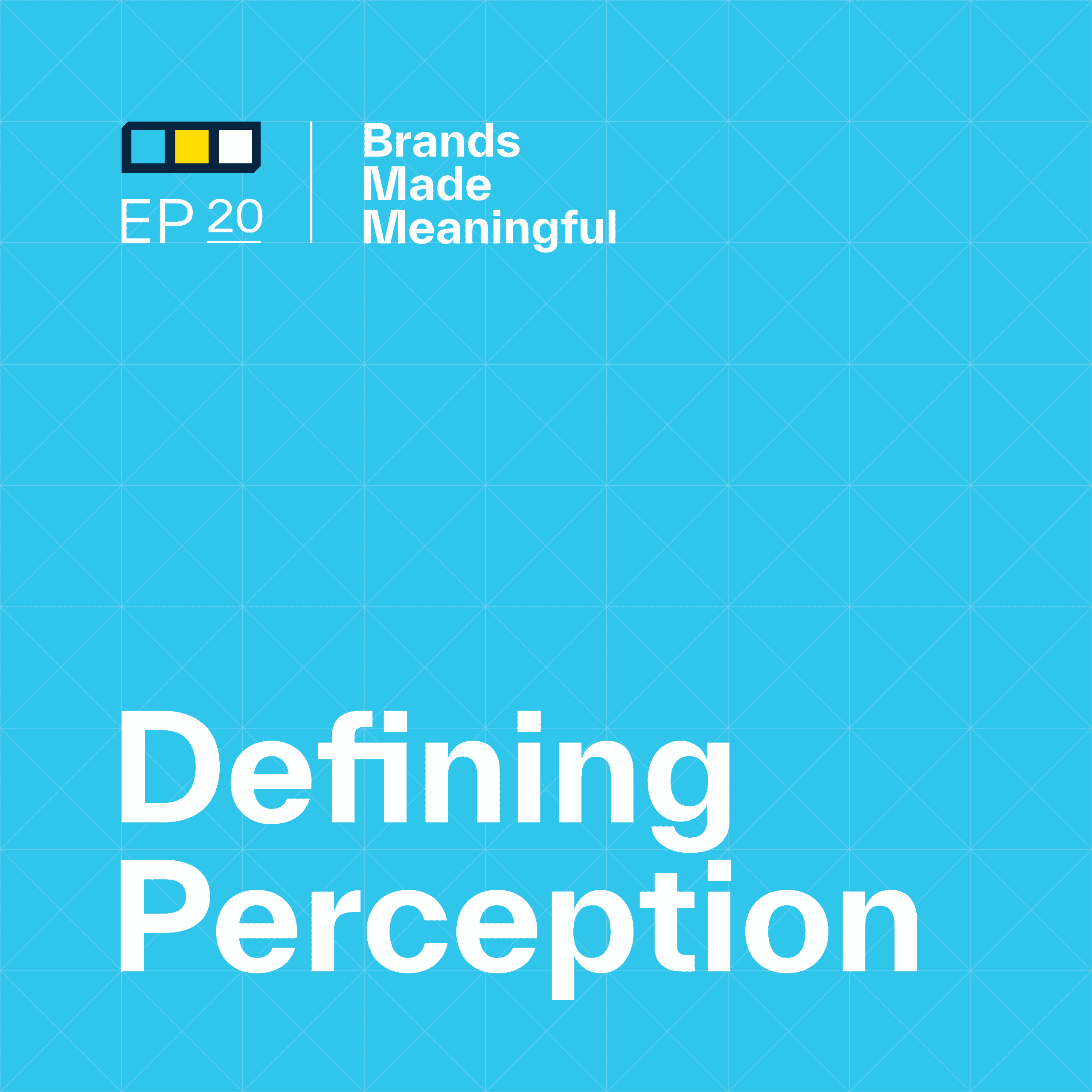EPISODE 06

It’s All in the Name
Episode 06
Derek and Tucker discuss what a name can say – and not – about your company
EPISODE TRANSCRIPTION
In today’s conversation, we’re talking about naming.
Tucker
Naming. Naming products?
Derek
Not children. Not babies. Maybe it is your baby if it is your business or your initiative, but coming up with that word or a couple of words that you use to legally (usually legally) name your organization.
Expand Full Transcript
Tucker
To identify; naming organizations, products, programs, and initiatives. There are so many different things that you can name; there’s brands, there’s subbrands.
Derek
Once you get into the brand architecture, you can get tiers into specific services or technology programs.
Tucker
We worked with a client that had a deep brand architecture and one of their challenges was naming programs and initiatives, and that was quite the naming process.
Derek
That was programs and initiatives underneath 8 divisions within one department of this large organization.
Tucker
Yeah. With only internal-facing viewership, right? So that’s the interesting part about naming is most people think how can I name my business for my customers? And there are so many different naming conventions that are really important even for internal use for clarification and understanding in that way, too.
Derek
Today, though, let’s focus on the umbrella, sort of the top of that brand architecture and look at the parent brand or the parent organization. The primary business name.
Tucker
I think to simplify it, it’s the easiest way to look at naming from that convention and going down from there. It’s a similar process, just different challenges.
Derek
You know, this is interesting and we can be a little self-effacing here because the name of our business is Sussner, which is my last name. Because 20 plus years ago when I started the business, I literally couldn’t come up with a name. I locked up, I tried. I had lists of names. I still have that list and I just couldn’t come up with a name. They were either too creative, not descriptive enough, and I literally punted. So sometimes when we talk about naming for our clients and people look at our name, they’re like, Well, you know, you guys just want the easy route. Luckily my name is not a common name and-
Tucker
It worked out nicely that way.
Derek
And you know, it’s not the same name as another business in our industry that’s doing something similar. But it’s tough. It can be really challenging.
Tucker
And we’ve even had conversations where you say, I kind of want to rename. I kind of want to rebrand, and rename the company because of all of this work we do for other people.
Derek
It’s inspiring.
Tucker
And it’s like, it would be right to change the name of the company for X, Y and Z reasons. So we’ll get into that in a little bit, but I want to talk about why this matters before we talk about how we know we need a new name or what the problems are.
Derek
Well, you have a good analogy about, in a nutshell, why does the name of your business matter?
Tucker
Yeah, and I got this from a book from the author, Eli Altman.
Derek
We’re adding this to our book club topic list.
Tucker
It’s actually a phenomenal book about naming. I think he runs an agency in San Francisco. The very first part of this book is, “Your brand’s name is really the verbal cover of your book.” Which I think is a great way to think about this. But whether we admit it or not, everyone judges books by their cover.
Derek
Think of scrolling through Netflix and looking at movies that you’re thinking about watching. Some of those design covers are so small that you can’t get a sense of what the movie’s about from the cover. So you’ve got three words, four words, maybe to decide whether or not that’s something that’s going to be relevant to you.
Tucker
Yeah, it’s a great way to start thinking about the importance of all of this. To say, if your name is that cover, how are we going to utilize it to introduce someone or at least start the conversation about what the story of this brand really is? And the importance of all of this kind of comes back to saying, this is super important, but it’s not easy. This is going to be an impactful thing that your brand’s going to use to market itself and to really resonate and be recognizable across many different channels.
Derek
So somebody who’s listening to this, why would naming be relevant to them? What’s going on in a business where they would consider renaming. I mean, it’s easy if they’re launching or starting from scratch.
Tucker
Yeah, I was gonna say there are two ways to really look at it. It’s either they’re starting it or there’s been a change and either they’re offering their corporate strategy or something around how they’re going to grow their business that’s made them realign where they’re going.
Derek
It could be a recent merger, two companies coming together and deciding on a new name instead of using one of those existing names. We talked with a company just this week whose name was chosen specifically because of the industry they were in, and then now, however many years later, they’ve expanded into all kinds of industries. So they’ve just shortened the name to an acronym, or a series of letters, that now don’t mean anything.
Tucker
Yeah, in that example, they had a name of who they do it for, but not what they do. Which made it really hard for them to have a name that stayed with them and stayed relevant for a long time.
Derek
Especially as the “who they do it for” expanded and changed.
Tucker
Exactly. So it’s tricky to do if you narrow down too much to say, our name is just our flagship product. That can really kind of pigeonholed you too because you’re going to come up with more products and services as you go that will expand change and shift based on the growth strategies that you have. So it’s really important when we’re looking at this either from someone who’s launching a brand new naming project or a brand new brand versus someone who has one today and they’re not happy with it. It kind of comes back down to that same process and we’ll go through that process a little bit. But why don’t you talk about what happens if we don’t deal with this properly? What are some of the things that someone would see and say, “Oh, man, I’m just having this problem with naming?”
Derek
One of the most common ones that we hear is, “Our name just doesn’t resonate,” or even worse, “It confuses.” So when I introduce myself from Company X (to anybody; a networking event or a prospective employee or prospective customer) and then that name, “Hi, I’m Derek and I’m from Company X.” The worst case is it causes confusion. You know, maybe the second worst is it’s just so ambiguous or vague that it just doesn’t mean anything and it doesn’t stand for anything and it doesn’t further that conversation about your brand.
Tucker
Yep. I think the most common challenge that clients come to us with is it doesn’t help us tell our story. To your point, it doesn’t help us communicate who we are, but it really doesn’t help us when we say, “Hey, I’m from X” and someone goes, “What does that mean?” And you explain it and they go, “Oh, okay.” Or your salespeople are super uninspired about what the name is and they’re almost borderline embarrassed to say, this is where I work.
Derek
Yeah. I mean, it could be a name that was named after the founder or the string of founders. And sometimes those founders aren’t even with the company anymore; they’ve sold or moved on. We even have it to where people can’t pronounce it.
Tucker Yeah, absolutely.
Derek
Or another one is if your name is the word that you use, like here in the Twin Cities, the word Viking. We worked with a company recently that had the word Viking in the name. And because of our professional sports team here locally, we did a little bit of research and at a glance, there are hundreds of companies in this region with the word Viking in their name in some way.
Tucker
Absolutely. I think there’s a little bit of market saturation, too, that goes into it. Where people don’t realize that the reason why you think it’s such a good name and it was so easy to come up with is because it’s being used a lot. Right? It’s an easy solution.
Derek
And some of those were chosen, I think, before the real prominence of the Internet came and finding URLs and/or they’re picking names that today you’d never be able to trademark. The word “heartland” is another one that’s in all kinds of businesses in the Midwest.
Tucker
Yeah, absolutely. So we’ll just recap there quick; it doesn’t resonate, it’s not reflecting on really what you do anymore or who you are or what you stand for, it doesn’t help you tell your story, it doesn’t stick out in the marketplace, doesn’t do any justice to salespeople trying to sell your product or service because it’s just generic.
Derek
It doesn’t help you stand out, differentiate, maybe even confuses people.
Tucker
So then how do we approach naming here?
Derek
Yeah, there’s an approach that we use just to establish three parameters, three pillars that we customize to each specific client so that it’s not boilerplate once we drill down because the solution is going to be unique based on each individual client’s needs. So there are three categories or three pillars that we tend to work from. There’s a “must.” This name must do X, Y and Z. And so these are the rules or the requirements that this name and this initiative has to achieve.
Tucker
And the goal for that is to then understand what’s going to work and what’s not going to work. Not to put preferences to things, it’s not saying, “I don’t like names like this;” that’s not a part of the Must category. The must category would be something like if your salespeople have determined that it has to be an English word, that is a requirement, that’s not a preference. Just because of the nature of your business, you have to communicate it like this. What’s the next one?
Derek
The second one is the category that we call “embrace.” So after the must category, it must do this, now these are the tenants that we’re encouraging ourselves to really consider these specific things. And I think what draws to the top of that list of embraces is what we would call the Brand Foundation or the guiding principles of the company that we’re working with.
Tucker
Yeah, I think that this piece really is filled out through the pieces that precede the work we do with naming. It’s really understanding the position of the brand, really understanding the reasons why we’re here and the story we’re really trying to tell. Once we figure those things out, we can fill out that embrace column pretty easily, and this is where a lot of the inspiration really comes from.
Derek
Yeah, I mean to know what the “why” of a company is, what their purpose is, and the mission of what they’re really trying to achieve. Even understanding the core values of the team and their culture all can be really inspirational going into this naming concept phase.
Tucker
Yeah, so then the third one, what’s the last one?
Derek
The “avoid.” For some businesses, it might be to avoid something being trendy. In another business, the embrace might be trendy. So it’s to determine specifically for that client and that specific organization what the avoids are.
Tucker
Yeah, I think this is where we really look at the market and say, “What our competitors doing? What is their name? How is that resonating? Not resonating? How can we stand apart from them?” I think the biggest issue a lot is that people like trendy names, like names that don’t have vowels in them. Which is a good example of saying, “Oh I really like how they did that.” And that opens the door for a lot of legal standpoints or URLs because it’s not spelled the same or stuff like that. But I think that that’s a trap that a lot of people fall into. That maybe in ten years we’ll look totally out of place and look very dated. I’m sure there are lots of examples that I’m just not thinking of right now. Of eighties and nineties names that just look so out of date right now. You can even see things from not too long ago with “I” in it, and that works for them.
Derek
“I” as in “I”Phone or “I”Heart.
Tucker
Yeah. Like Iphone or Ifix and stuff like that too to resemble internet-work. That seems to be starting to come out of date a little bit. Unless there’s a really deep reason for that name, it’s mainly just a trend.
Derek
So we have a process that we go through, and I don’t necessarily want to bore everybody with the specific, say, eight steps that we go through in a name. But I think there’s a couple of highlights that come out of the overall process that would be really helpful for people to be considering. So if somebody is working with an agency or a firm or even trying to DIY this naming process themselves, there are a couple of things that they want to make sure that they’re aware of and they’re thinking about.
Tucker
Absolutely. And I think it’s a little heavier on some than others. I think when you said it’s an eight-step process that we take, step one is this blue sky concepting. How can we take these musts, embrace and avoid categories and really come to the table with a bucket of really great names that could work based on what we’ve talked about? And at this point, we don’t necessarily hone it in by saying these are usable at this stage, but we want to get as many great names as we possibly can. So that we can start picking at the list and going, “Well, why does this one resonate and why does this one work?” So starting to refine those pillars that you mentioned. We can keep adding to the musts and embrace and avoid pillars once we do concepting because you’ll start getting this feel for it once you move through that.
Derek
Yep.
Tucker
People ask us sometimes, “Well, how many names do you concept?” I get that question a lot. And we do it until we have a solid foundation of names that really help us understand. If we don’t resonate with a name, then we’re not going to use it. It’s off the table, so we don’t even count it.
Derek
You’re talking about having a batch of names that have passed our internal test. That have passed the must, the embrace, the avoid categories and in our minds feel in line with the way that this brand wants to be perceived.
Tucker
Yeah, and I think that there are two ways to look at that. We can sit there and say, “Oh, well, we might be wasting time because the first one was really great and it’s going to pass all of the legal inspections. It’s usable and we’re good.” But there’s also this sense of being able to test names against each other, to say which one resonates. Which one of these is better for the brand and for the brand moving forward? And that gives us this really strong validation for what names work and which names don’t work, and then makes us more confident once we actually get into the legal checking of it and then present it to clients. So the concepting is what I would call “blue sky.” That’s the blue sky stage where anything and everything, no idea is a bad idea as long as it leads with these must, embrace and avoid categories. So then after that, we do a pretty thorough search through the web when it comes through social, Google, and other sites.
Derek
But what we don’t start with is we don’t hop on the web URL providers and start searching URLs right away.
Tucker
No, URLs are the last thing that we do.
Derek
We’ve come across perfect URLs- word.com absolutely was available but we then found out because you know maybe we search that first instead of second, we then found out that word wasn’t available and had already been trademarked and patented. It’s just happened that that company didn’t buy that dot com.
Tucker
Yeah, and if you look at a lot of big brands nowadays, there are a lot of great things that they can do, especially at a large size, they don’t necessarily get their one brand name dot com right away.
Derek
Well, I’m not going to say it’s impossible, but having Word.com is becoming harder and harder to secure.
Tucker
Absolutely, unless you have the finances to really secure and acquire it from somebody else. I think there are many, many, many brands that utilize maybe their name plus what they do as their dot com. I know right now Tesla is Tesla.com, but it used to be (the Tesla car company) used to be Teslamotors.com. It used to be the idea is like, “Oh yeah, that works because that’s what we do.” And now they do much more than that, so they acquired the Tesla dot com. But from a standpoint of the clients that we work with, it’s absolutely the last thing you do. Because you would hate to get into the URL space and say we picked our brand name for the future of this company, for the future of this product, because the URL was available. That’s not a good rationale. We should really pick the right name and then discover what URLs are available to us and pick the right one from that.
Derek
Well, the social media search is something that I think a lot of people don’t realize could be a critical step. We’ve come across lifestyle businesses that were promoting themselves on Instagram or Pinterest.
Tucker
Yeah, there is a critical piece in looking at social because social will give you a cue into some people that might have trademarks in there already and what they’re selling their services for gives you a good idea of where you might come across the legal standpoint. But when you look at social media, you look at it the same as URLs. We can always have a different handle that expands upon it. We don’t have to have our one-name handle as our social media URL, that’s towards the end of the list. So once we concept, that next step is to do a high-level web search because that will also take us into, not the URLs, but really the legal position that some people are taking based on what they’re selling and to who.
Derek
And I think the critical step is then going on USPTO.org, U.S.Patent.org, TademarkOffice.org. Figuring out what legal classes your specific business lives in and to do a search through that. At least on your own, you can do an initial knockout search.
Tucker
If you don’t know what legal classes you are in, it is a simple conversation with an attorney and they’ll probably be able to identify it really quickly. Or you can even lookup the legal classes in the USPTO and it’ll explain what each one is so you can get a really good idea of where you sit in there. And so what we do, we’re not lawyers by any means, but we found that the most surefire way to get to a good name that will most likely pass inspection is for us to do a sweeping USPTO search on that brand name and pull out anything at all that has a similar name or uses it in the same fashion under any class. And then also cross-reference that with the classes that we believe we’re in. And normally we talk with our legal partner to say, “Hey, these are the classes we’re searching for” and they’ll give us, “Yep, that makes sense. This is the legal reasoning for that.” Or they might lead us into a different class and say, “Hey, you might have better luck in X class because that’ll be easier for you.”
Derek
It’s also why some companies have opted to get creative with their names and take the vowels out or use totally made-up names. Because it may be easier for you to trademark that word, than what we would call a natural word, like an English common word that everybody is already aware of is going to be much more challenging.
Tucker
So there’s a difference between a made-up word and a non-vowel word. Because a non-vowel word, let’s take the word “movement,” you take all the vowels out of it, and it still sounds like movement. So from a legal perspective, at least from where our legal team has advised us on past projects is, it doesn’t really matter. If there’s a brand named movement doing the same thing that you’re trying to do and you’re a brand named movement with no vowels; there’s still confusion in the marketplace.
Derek
And that confusion is a key part of that legal precedence.
Tucker
If there’s confusion in the marketplace, you most likely have no legal precedence.
Derek
So there might be a name that you land on that actually isn’t taken, but it’s so similar to a name that is taken and that’s already been established that your name would cause confusion if there’s any potential confusion from a prospective consumer, it’s quite likely that they’re not going to let your name pass.
Tucker
And this is where we need to have a trademark attorney in on one of these conversations. I think the next time we talk about this, that’d be a great option. Because there’s still gray area in there, it could be one letter off and the word might be different, there might be a little bit of confusion for some people, but as long as there’s a legal argument against there’s no confusion, then normally our attorney would say you have moderate or severe level of risk and we’re comfortable or not very comfortable taking that risk and fighting it if ever they were to come back to us (and we can get into that another time. I think that’s a long, long path of saying, how do you trademark something?) But once we get that over-sweeping search of the USPTO, from our mind, we don’t have the legal to do their in-depth search quite yet. We then do a URL search based on that. Once the ones come back that we say, “These ten are fantastic names.” We didn’t see anything on USPTO based on our legal advice from what classes we should be searching on. So we do URL search on that and say, “Here are the top URLs that we can secure today if wanted to.” And we do a high-level social media search on what handles we could also secure. Then we present that to the client. So before you get presented anything, you’re only looking at names that we feel with a pretty high-level of confidence that we could give this to legal, they would agree upon it, and we would move forward. And the only time that we’ve had problems (or not problems, but challenges) with that is when we’re dealing with brands in highly, highly competitive spaces that have, like you mentioned a long time ago, they have a lot of lifestyle brands- like clothing, apparel, brands. That can make it difficult because someone could be using a name and they could have very, very small amount of sales, a very, very small organization, but since they’re using it, they legally have the right to have that name; they could come after you. So I think it’s interesting when we look at the nuances of that.
Derek
So if somebody, let’s say they’ve just merged and you’ve got two organizations that have come together and they’ve determined that neither of the existing names for this organization as a whole are valid for a variety of reasons going forward. What’s something that [the people within that organization] that might help them, that might guide them in sitting down and starting to think about what a brand new name might be? Purposefully. Besides just, you know, you said earlier to be purposeful over preference and there is a preference because in the end, you’re going want to like your name.
Tucker
Oh, absolutely. We do everything with the mindset of purpose over preference, but when it comes to anything, we’re not naive to say that people’s preference is not in play. There’s also a little bit of if you don’t like it, it’s going to be really hard to sell it. But at the same time, it’s really hard to sell it if there’s no rationale behind it, and what you like might not be what your customers like. So keeping that in mind, there’s a little bit of gray area in there. But the first thing that someone can do if let’s say what you said, a merger, there’s two companies merging, and what I would say the first thing that they should do is they should master and articulate their position. They should understand how they want to be perceived. And if they’re utilizing either of the first two acquisition names, either of the merged names, if that comes into play with their position, whether one of those brands had a really great position beforehand, I’d consider some of those things and say, “Does someone have more equity? And why is there equity in it?”
Derek
What do we mean by position?
Tucker
Position is what you stand for, what you represent, how you want to be perceived in the market. What you’re offering is comparatively to other people’s offering. It’s really the position is how you corner yourself. What’s your unique angle at the sales? … I keep going back to what’s your position?
Derek
Yeah. It’s, what do you do? What you do.
Tucker
Yeah, it’s what you do, but what do you do in a unique way that resonates differently?
Derek
Yep. So positioning and understanding your positioning, and even how you describe and articulate and verbalize your positioning, is critically inspirational to guiding that naming process.
Tucker
And I think that your first decision is, do we want to keep one of these names? Do we want to do a word smash and take the two names, we feel like there’s equity in both them and make one name out of the two of them?
Derek
Does that help you tell your story?
Tucker
Does that help you do that? Or do you come up with a completely new name? And I think those are your three options, is to figure out if you want one, you want to smash them or you want to get a completely new one.
Derek
And that’s a separate podcast. I think the pros and cons of those three approaches in the what are the challenges that come with each? What are the opportunities that come with each? That’s a separate conversation.
Tucker
It’s too long for this, but then once you’ve decided which direction you’re going to move in, and maybe this is a part of that direction too, is figuring out what business you’re really in or what we’re saying is, what is your story?
Derek
Your brand story.
Tucker
Yeah. If you can understand the story you’re trying to tell and the heart, the core of that story, it makes it really easy to, one, make that decision of saying, “Okay, we have these decisions on the table. This is the way we’re going to go because maybe this name doesn’t really resonate. This doesn’t tell our story and the smash name, doesn’t tell our story either, so we’re going to go with the new one.” And if you go that route, understanding what story you’re really telling or the business that you’re really in, makes it way easier to start really forming this opinion on what can be right and what can be wrong and putting rationale behind it. So that’s what I would say. That’s your first step, and then from there, what I would do first is a competitive reconnaissance, or recon on the names in the market. Who are the people we are competing against? What are they doing? Do they use an acronym for their name?
Derek
What’s going to help us stand out?
Tucker
Do we do that same thing? If we’re X, Y and Z company and they’re A,B,C company that’s probably not going to work out. If we’re both using that same thing, we should probably readjust. That really goes a long way to validating your position, one, but your direction another way.
Derek
And you’re differentiating.
Tucker
Exactly, so if you can do those first two steps, then it gives you a little bit of clarity on what’s going on. And then you can also have an idea of why the names, say you’re doing this internally, why those names aren’t resonating. Well, do they tell the story that you’re really trying to tell? Do they help you communicate what you’re trying to communicate? And if they don’t, well, then there’s your answer. If they do, then is it because everyone else is using that same name system? So there’s a lot of things at play here, but I think when it comes down to naming, the hardest part is being really close to the sun, too. When you’re doing this and you’re doing all the naming and let’s say they’re doing it internally and you’re leading that approach and you’re a part of the leadership team, there is a little bit of: you’ve got the blinders on, you’re trying to figure this out and you’re just struggling with it – and that’s hard.
Derek
Yep.
Tucker
And we’ve even had leadership teams where we do this, and we do this for six rounds because it’s like we just can’t get it right. So we have to bring in other leadership for-
Derek
For additional perspective-
Tucker
Yeah, a completely fresh view on it. And that has gathered great returns on what happened. I mean, even a project last year when we worked on it, we were down probably four or five rounds of naming, put it in front of additional leadership people, and out of that came, “That’s the right name right there. That’s the right one. Why aren’t you picking that one?” And it’s like, “Well, yeah, it’s a great name, but what about this one?” They’re like, “No, no, no, that one, that first one is the right one. This is exactly what we do and who we are and the story we’re trying to tell.” And I think that comes from being too close to the sun sometimes.
Derek
Yep, the one other piece I would layer on top of this is (and I don’t want to get into the weeds of our own process), as part of a brand foundation, one of those key steps is to clarify how you want people to think of you; your organization? Not necessarily your name, but how do you want people to associate the experience of you, your business, and working with you? And if you can come up with that list of five or six adjectives or characteristics that describe that experience, then make sure that the names that you’re concepting support or are supported by that. When I say, “We just came up with name X.” Does Name X represent these characteristics? Does it stand for this? It’ll help you from throwing darts.
Tucker
Absolutely. And I think throwing darts is the most common way people try to name something is, “Well, can we think of a cool name? And let’s just throw some darts out there and see what happens.” And I think that’s super easy, but it’s almost not helpful.
Derek
And I would also say give encouragement that the name is critical, but it doesn’t have to do all the heavy lifting. Your name will ultimately be supported by potentially a tagline that then helps tell me a little bit more. It might very likely be supported by visuals and other components of that. And that’s another conversation.
Tucker
Absolutely. Just because it’s the cover of the book doesn’t mean the book can be crap.
Derek
Right.
Tucker
Right? So it absolutely matters. Your name is super critical to all of this, but so is the meat of that book. And you can have a bad name, you can have a bad cover of the book, but you can have a great book. And people will buy it, people will love it.
Derek
Makes it harder to sell the book, though.
Tucker
Exactly. It makes it harder to sell the book, but the internals is what really sells that book. So like you said, it’s not the end of the world to have a bad brand name, but it makes it a lot easier to be successful if you have a good one.
Derek
All right. Until next time. Thanks for listening.
More Episodes Like This
Winning the Talent Game with Tom WallaceEpisode 86
Tom Wallace of Kopplin, Kuebler, & Wallace joins Derek and Tucker to discuss the importance of a club’s brand in hiring and retaining right-fit employees.
Reclaiming Reputation Through Brand RevitalizationEpisode 85
Derek and Tucker discuss the potential that a branding initiative can have to restore a club’s reputation.
Branding The Club with Don KovacovichEpisode 84
Don Kovacovich, GM of The Club at Golden Valley, joins Derek & Tucker to discuss the impact that rebranding has had on his club and the opportunity it presents for other clubs
Changing a Club’s Membership ModelEpisode 83
Derek and Tucker discuss key considerations and challenges when changing your club’s membership model.
Connecting a Club with its Story with Jackie CarpenterEpisode 82
Derek and Tucker are joined today by Jackie Carpenter, author of People First.
Branding a Club AnniversaryEpisode 81
Derek and Tucker discuss the unique opportunity presented by milestone and anniversary dates for private clubs.
Private Club Storytelling with Ricky L. Potts, Jr., CCMEpisode 80
Derek and Tucker have the pleasure to speak with Ricky L. Potts Jr. about how powerful storytelling can be for your club members.
Opportunity in Club Facility RenovationEpisode 79
Derek and Tucker discuss pivotal key moments in your legacy and how to transform your story through renovation.
The Evolution of Club Members with Jon LastEpisode 78
Derek and Tucker are joined by Jon Last from Sports & Leisure Research Group to discuss the evolution of club members.
Member Branding vs. Product BrandingEpisode 77
Derek and Tucker discuss the challenges their client's have moved through when approaching differing styles of branding.
The Role of a Private Club's LogoEpisode 76
Derek and Tucker take a look back on private club logos they've designed over the years and explain the strategic reasons behind their choices.
Club Brand GovernanceEpisode 75
Derek and Tucker divulge the steps to evolving your brand while retaining your core values.
Seasonal Member MerchandiseEpisode 74
Derek and Tucker take a look at crafting specific merch to celebrate landmarks and special times of the year.
Who is Sussner?Episode 73
Derek and Tucker take a break from talking shop to talk about who they are and what they stand for.
Club Identities Beyond AmenitiesEpisode 72
Derek and Tucker discuss what it takes to stand out in unique ways for your club.
Little Things Mean EverythingEpisode 71
Derek and Tucker take a look at the often missed and easy to overlook.
Build Flexible Brand SystemsEpisode 70
Derek and Tucker break down the building blocks for long lasting branding.
The Club at Golden ValleyEpisode 69
Derek and Tucker take a close look at one of their recent rebrands.
When to Launch a Club RebrandEpisode 68
Derek and Tucker break down how to find the perfect timing when launching a club rebrand.
Steps to Launching a Club RebrandEpisode 67
Derek and Tucker break down the steps to take and the reasons why you should consider a club rebranding.
Brand Marketing vs. Brand DesignEpisode 66
Derek and Tucker define the line between marketing and design and how they intersect to inform one another.
Building Brand GuidelinesEpisode 65
Derek and Tucker show us how to build infrastructure guidelines to unify your brand experience across the board.
Club Identity SystemsEpisode 64
Derek and Tucker cover what Identity Systems entail and how to discern between internal and external methodologies.
Navigating Branding With a BoardEpisode 63
Derek and Tucker bring clarity to uniting your company under one cohesive vision.
Putting a Committee TogetherEpisode 62
Derek and Tucker assemble your need-to-know facts when putting together your committee.
The Guiding Principles of Private ClubsEpisode 61
Derek and Tucker go over the top ways private clubs can find the balance between pleasing old members while attracting new ones, all while making moves towards the future.
How Color Affects PerceptionEpisode 60
Derek and Tucker cover how to best convey your business with color.
Brand EcosystemsEpisode 59
Derek and Tucker break down how to craft effortless experiences when considering your brand as a whole.
6 Types of Brand TransformationEpisode 58
Derek and Tucker dive into 6 distinct types of transformations for a wide range of brands.
Tournament Branding For ClubsEpisode 57
Derek and Tucker discuss designing and delighting your club members with tailored events.
Brand Promoters & DetractorsEpisode 56
Derek and Tucker discuss how high level promoters increase your NPS and how to turn the tides on your detractors.
The Loudest Voices in the RoomEpisode 55
Derek and Tucker talk about gathering feedback while prioritizing every voice.
Determining A Primary AudienceEpisode 54
Derek and Tucker discuss if and when you should be honing in on your audience vs. casting as wide a net as possible.
Branding For ExclusivityEpisode 53
Derek and Tucker discuss the intricate process of naming your brand.
Measuring Brand SuccessEpisode 52
Derek and Tucker discuss how we measure our success in branding and a few key KPIs that help us understand our impact.
Branding For ExclusivityEpisode 51
Derek and Tucker breakdown how brands can create the perception that they are exclusive and only for a certain type of consumer.
What Makes A Brand SurprisingEpisode 50
Derek and Tucker break down the Sussner formula that we believe leads to a surprising brand.
Breathe Life Into Brand TraditionEpisode 49
Derek and Tucker discuss the intricacies and common pitfalls of branding for Private Golf Clubs.
They Key of Visual DifferentiationEpisode 48
Derek and Tucker break down the importance of differentiating your brand on a visual level.
Branding For Private GolfEpisode 47
Derek and Tucker discuss the intricacies and common pitfalls of branding for Private Golf Clubs.
Dealing With An Identity CrisisEpisode 46
Derek and Tucker breakdown how to identify and remedy a brand's identity crisis throughout thoughtful and intentional brand management.
Branding vs MarketingEpisode 45
Derek and Tucker discuss the differences between Branding and Marketing and how to make the two compliment each other.
Build Your Brand's FoundationEpisode 44
A brand's foundation is a critical element in being successful in the long-term.
Building a Constructive Branding ProcessEpisode 43
Derek and Tucker break down the steps required to build the most constructive and meaningful branding process.
What Makes a Brand Relevant?Episode 42
Relevance is a key piece of a brand's identity for creating clarity and connection.
Your Right to WinEpisode 41
Derek and Tucker discuss the “Right to Win” and the odds of your brand's success within your target market.
An Intro to Sub BrandingEpisode 40
Derek and Tucker discuss the nuances of developing sub-branding and strategies.
Conquer Branding FearsEpisode 39
Derek and Tucker dive into how to overcome the fear of change and the nature of constant refinement of your brand.
Balancing Strategy & DesignEpisode 38
Great strategy is a necessary foundation for great design—and great design brings great strategy to life.
Branding PrioritiesEpisode 37
Branding priorities are the actions and initiatives that shape or enhance a brand's identity, perception, and market position.
Invest in Your BrandEpisode 36
Investing in your brand benefits your company as a competitor in the marketplace, builds trust with customers, increases perception of quality, and drives employee engagement.
Why is Positioning Scary?Episode 35
Narrowing the brand's position is really a strategic decision to focus the brand's offerings, messaging and target audience on a specific niche or segment within the market.
What Are Brand Consultants?Episode 34
Derek and Tucker discuss the importance of hiring expertise with a wider breadth of knowledge than just visuals.
Hire for Brand FitEpisode 33
Hiring people that fit your brand is key in order to maintain brand authenticity, positive culture, and consistent messaging.
Your Brand’s Stance MattersEpisode 32
Your stance can help define your brand from a core level and make branding, hiring, and marketing not only easier, but more meaningful.
Levels of Executing a Brand RefreshEpisode 31
If you have a brand strategy in place, how do you execute it?
The Role of Features & BenefitsEpisode 30
Derek and Tucker discuss the importance of features and benefits within the context of branding, selling, and marketing your products and services.
Should You Listen To or Lead Your Customers?Episode 29
Within the challenge of any rebrand is the challenge of managing customers' perception of change.
Managing a Brand TransformationEpisode 28
Episode 28 discusses the highlights and challenges of rolling out a new brand, both internally and externally.
Living Your BrandEpisode 27
Your brand is not this shiny trophy on the shelf. It is something that you are molding every single day.
What Makes a Brand Authentic?Episode 26
Season 2 starts off with a discussion about building authentic brand experiences, both internally and externally.
Reviewing your Competition's CreativeEpisode 25
Derek and Tucker discuss the process of reviewing your competitors' creative strategy to better position your brand within the market.
Interviewing your Audience for InsightsEpisode 24
This episode details the process and benefits of interviewing your audience as part of the branding process.
Assumption ReversalEpisode 23
Derek and Tucker discuss how we change our thoughts and get into a different mindset to refine and revise our branding.
Developing vs. Amplifying a BrandEpisode 22
Another way to say it is, development is building and crafting your brand story, and amplification is then telling it.
Refreshing a Sporting Goods BrandEpisode 21
This episode shares the steps behind Sussner’s work in refining the Shock Doctor brand.
Defining PerceptionEpisode 20
Derek and Tucker discuss the positive and negative impacts of brand perception.
What is a Brand?Episode 19
Derek and Tucker discuss what defines a brand and what makes them successful.
Branding Golf Courses vs Golf ClubsEpisode 18
Derek and Tucker further hone in on golf course design.
Refreshing a Golf CourseEpisode 17
Derek and Tucker discuss the bar for golf course design – and how to push past it.
Let’s Talk Taglines Episode 16
Derek and Tucker talk taglines in today's episode.
Refreshing an Athletic DepartmentEpisode 15
Derek and Tucker sit down today to discuss what logos mean within branding.
Branding a Club Episode 14
Derek and Tucker discuss how to brainstorm branding a club.
An Intro to Internal Branding Episode 13
Derek and Tucker discuss the power behind internal branding.
The Value of Stereotyping Episode 12
Derek and Tucker sit down today to discuss the meaning of stereotyping within the branding world.
We’re on a Mission Episode 11
This episode digs into the rallying cry for the greatness your team is going to accomplish.
Aren’t Brands Just Logos? Episode 10
Derek and Tucker sit down today to discuss what logos mean within branding.
The Business You Are Really In Episode 09
Derek and Tucker sit down today to discuss how to discover what business you are really in to better understand your mission statement.
Clarity of Vision Episode 08
Derek and Tucker discuss the importance of looking ahead towards the big picture to better hone the purpose behind what we do in the now.
Branding B-2-B Environments Episode 07
Derek and Tucker discuss the Branding of Spaces.
It’s All in the Name Episode 06
Derek and Tucker discuss what a name can say - and not - about your company.
Delving Into Branding Data Episode 05
Derek and Tucker jump into the discovery phase of branding before it hits the drawing board.
Content Made Meaningful Episode 04
Today Derek and Tucker discuss the concepts within content and its common misconceptions such as the phrase "Content is King."
Brand Story vs. Brand Messaging Episode 03
Your story matters.
Visuals That Take The Cake Episode 02
Derek and Tucker sit down to discuss visual impact and what that could mean for your brand.
Are You Different or Distinct? Episode 01
It's not about being the only option, it's about being the right option. Join Derek and Tucker as they discuss Differentiation & Distinction.



